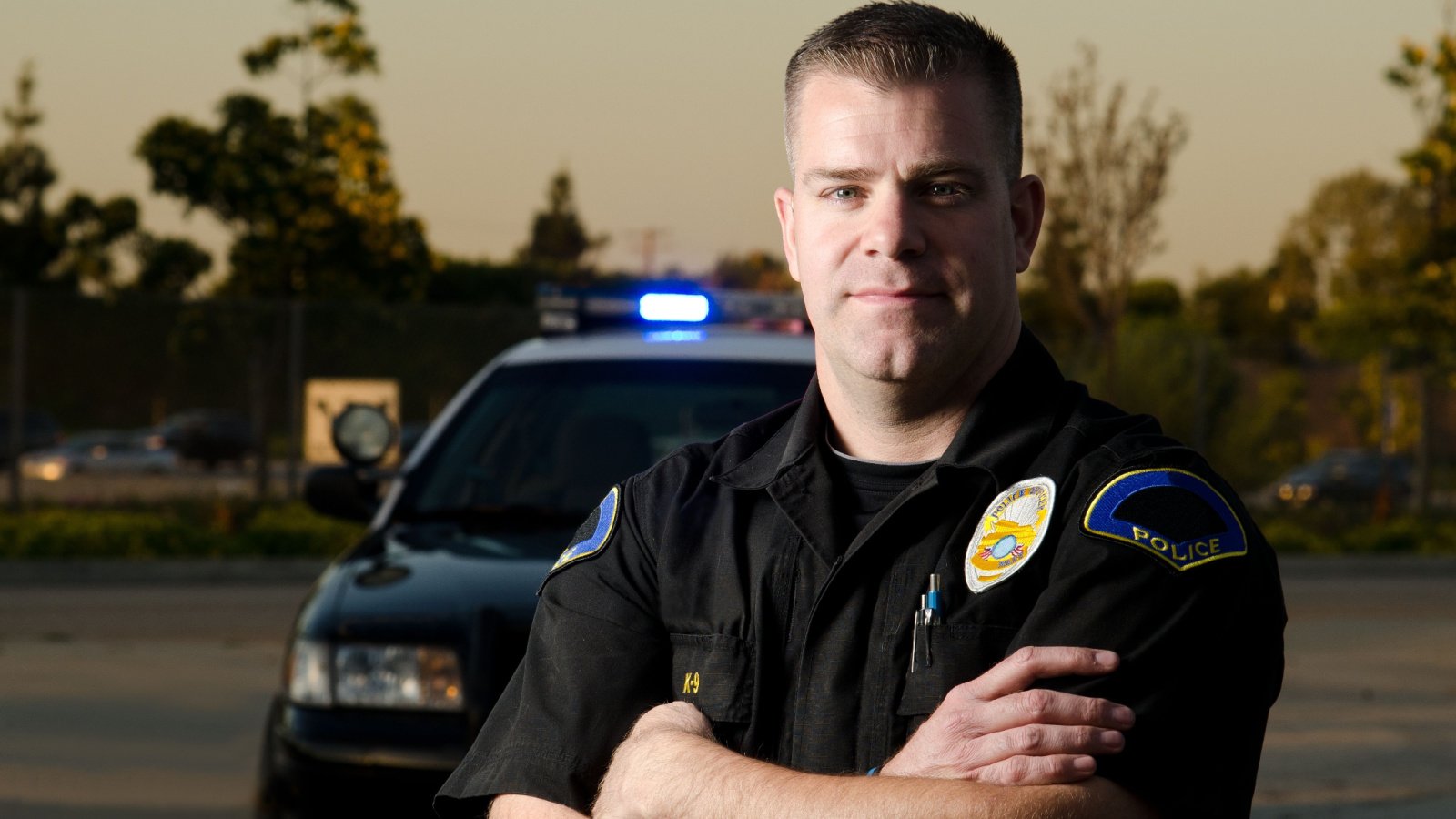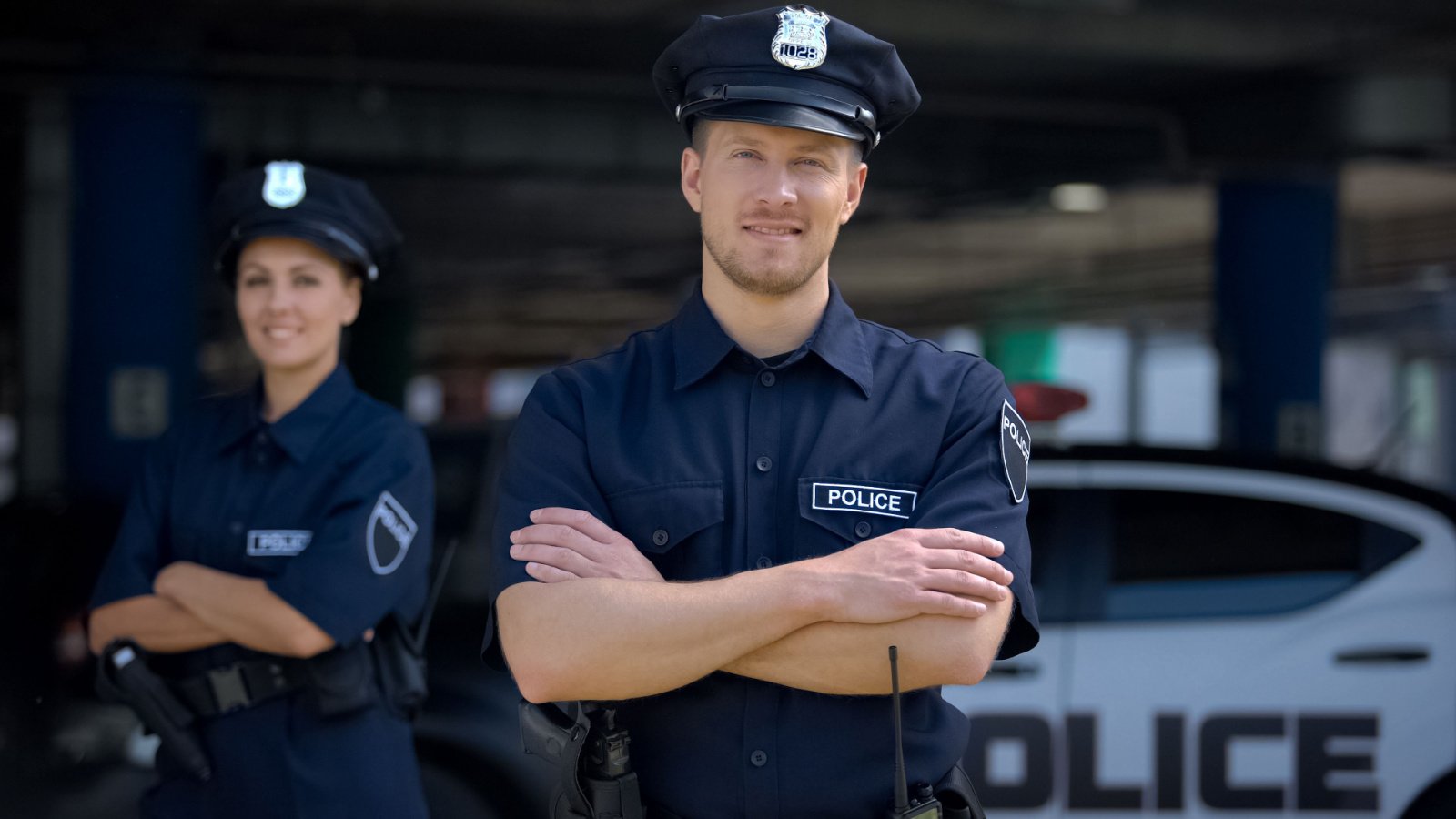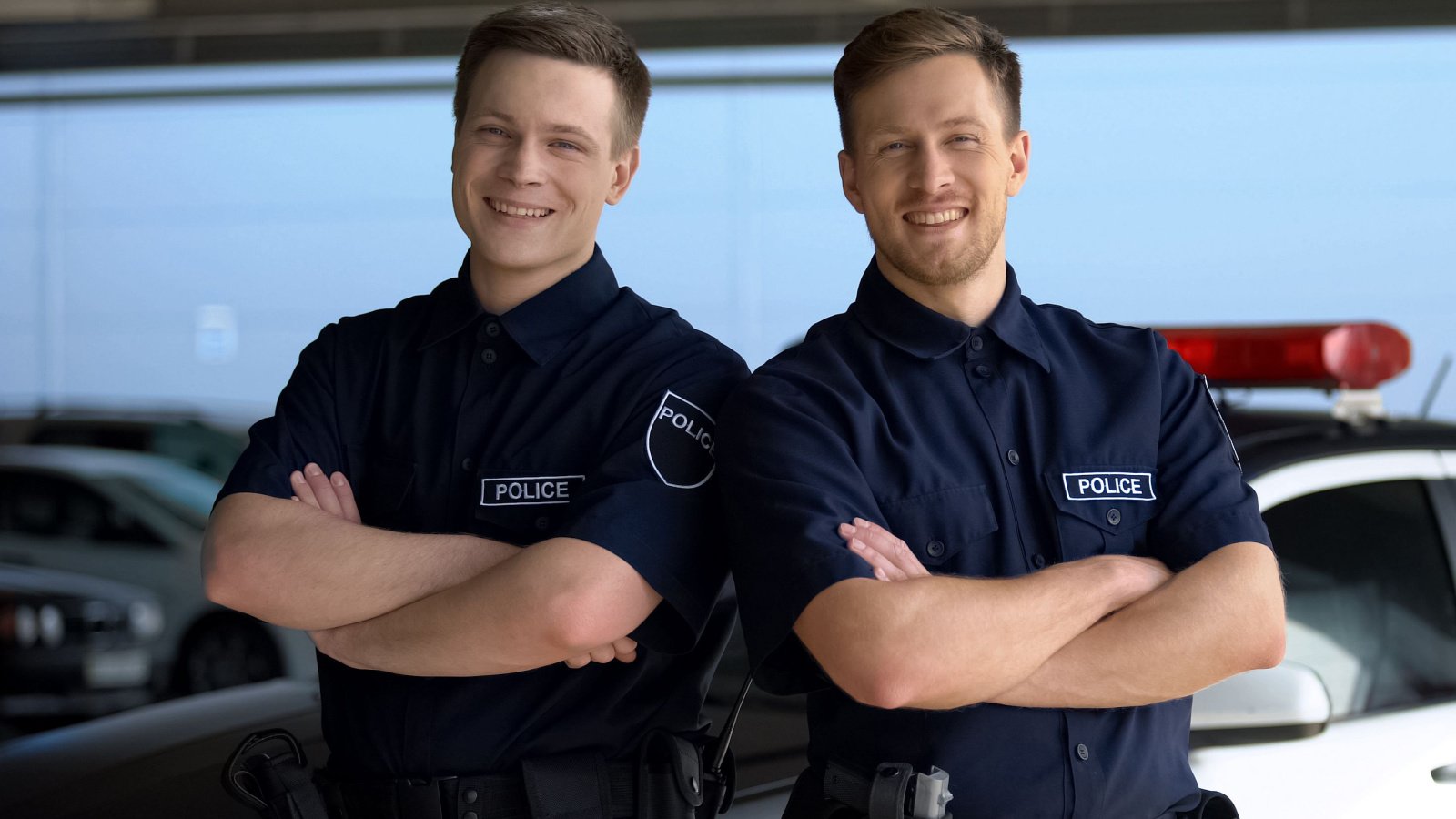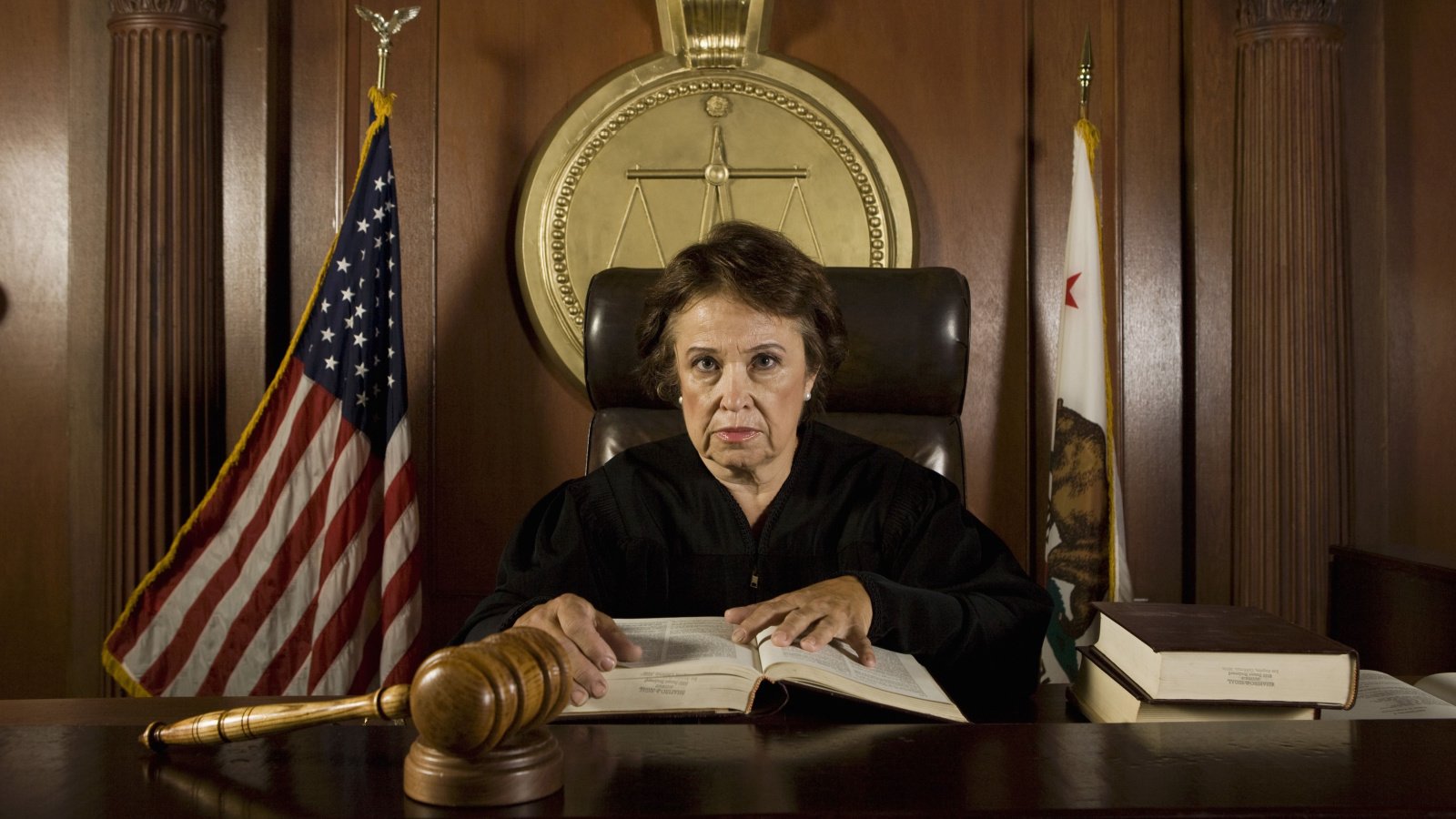When lights flash behind you, and a siren sounds, knowing what to say can be as crucial as knowing what not to say. Anecdotal evidence and legal expertise both suggest that certain phrases can escalate or significantly influence the outcome of an already tense situation when interacting with law enforcement during a traffic stop.
To safeguard your rights while maintaining a calm environment, it’s crucial to be aware of what not to say. Direct and indirect communication is critical in these stressful moments.
Why Did You Stop Me?

Asking a police officer why you were stopped can come off as confrontational right from the start. It’s better to wait and allow the officer to explain the reason for the stop. This keeps the initial interaction as calm as possible.
I Only Had a Few Drinks

Mentioning any alcohol consumption can immediately escalate the situation. It gives the officer a reason to pursue a DUI investigation. Instead, remain silent on the matter unless specifically asked.
Do You Know Who I Am?

This can be perceived as trying to intimidate or unduly influence the officer. It suggests that you expect special treatment due to your status. Such statements rarely endear you to law enforcement and could lead to further scrutiny.
I’m Friends with a Cop

Name-dropping to suggest you have connections within the police force can backfire. Officers might see this as an attempt to avoid responsibility for your actions. It’s best to handle the stop based on the situation, not who you know.
I Pay Your Salary

This phrase is often seen as disrespectful and can sour your interaction. It implies that the officer owes you leniency because you are a taxpayer. Respect and cooperation are more effective than flaunting perceived leverage.
I Wasn’t Doing Anything Wrong

Denying all wrongdoing immediately can come across as defensive. It’s more effective to listen to the officer’s explanation of why you were stopped. Questions or disputes about the validity of the stop can be addressed later in court.
You Must Be Bored

Suggesting that the officer has nothing better to do than pull you over belittles their duty. It can be interpreted as an insult. This comment is unlikely to make the encounter any easier for you.
This is Harassment

Accusing an officer of harassment during the stop can escalate tensions. It’s a serious accusation that can be addressed through the proper channels after the incident. During the stop, focus on being cooperative and collecting information.
Can’t You Let Me Off with a Warning?

Asking for a pass undermines the seriousness of the situation. It suggests you don’t respect the laws or the officer enforcing them. Let the officer decide the course of action without suggestions.
I’m Going to Be Late

While your timing might be an issue for you, complaining about it won’t likely change the officer’s procedure. It’s better to accept the delay as part of the traffic stop. Expressing urgency might imply reckless driving as a justification.
You Should Be Catching Real Criminals

This implies that their work stopping you is trivial. It can be seen as an insult to the officer’s judgment and duties. Officers are tasked with upholding all aspects of the law, including traffic violations.
This Car is New to Me

Claiming ignorance about your vehicle’s condition or nuances can lead to suspicion. It’s your responsibility to know your vehicle and whether it is in compliance with the law. This statement might invite further investigation.
I Don’t Have My License on Me

Driving without your license is a violation, and saying this won’t help your cause. Always carry your driving documents. If you’ve forgotten, politely explain the situation.
The Speed Limit Signs Were Unclear

Complaining about road signage can sound like an excuse. It’s the driver’s responsibility to be aware of their surroundings. Instead, it’s better to listen and respond appropriately to the officer’s statements.
Everyone Else Was Speeding, Too

Trying to justify your speeding by claiming you were just following the flow of traffic doesn’t absolve you of responsibility. It’s important to adhere to speed limits regardless of others’ actions. This statement can undermine your credibility.
I Need to Use the Bathroom

While this might be true, using it as an excuse to expedite the stop might not be taken seriously. If it’s an emergency, explain politely and clearly. Otherwise, wait until the officer has completed their duties.
Can You Hurry Up?

Rushing an officer can come across as rude and impatient. They have a process to follow for safety and thoroughness. Expressing haste might be interpreted as trying to avoid scrutiny.
I Have a Bad Day

While personal struggles are relatable, they aren’t relevant to the reason you were stopped. Keeping personal issues separate from the interaction is more professional. This approach helps maintain the focus on the matter at hand.
You’re Just Doing This Because I’m [a specific race/gender/etc.]

Accusations of profiling can escalate the situation significantly. If you feel you have been stopped unfairly, it’s better to address this through legal or formal complaints after the incident. During the stop, keep interactions straightforward and fact-based.
That’s Not My Stuff

Claiming ignorance about something illegal found in your car can lead to deeper legal issues. Ownership issues should be addressed through proper legal channels. During a stop, it’s crucial to avoid making potentially incriminating statements.
I’m Going to Call My Lawyer Now

Threatening legal action during the stop can create an adversarial tone. While you have the right to legal counsel, stating this as a threat isn’t constructive. If legal issues arise, handle them through the appropriate channels after the incident.
What’s the Big Deal?

Belittling the reason for the stop suggests you don’t take the law seriously. This can irritate the officer and decrease your chances of a positive outcome. Respect the process and address any disagreements later.
Just Give Me the Ticket

Demanding a ticket can cut short any chance of the officer possibly giving you a warning. It shows a lack of willingness to communicate or cooperate. Keeping a calm demeanor may lead to a more favorable result.









https://semaglupharm.com/# rybelsus vs ozempic for weight loss
Atorvastatin online pharmacy: Generic Lipitor fast delivery – is it safe to take atorvastatin and fenofibrate together
https://semaglupharm.com/# Rybelsus for blood sugar control
lipitor indication: LipiPharm – Lipi Pharm
side effects for rybelsus SemagluPharm semaglutide tablets vs injection
https://semaglupharm.shop/# how to get semaglutide out of your system fast
https://lipipharm.com/# Lipi Pharm
prednisone uk price: Predni Pharm – prednisone 60 mg tablet
online order prednisone Predni Pharm Predni Pharm
crestor 5mg vs 10mg: Crestor Pharm – what vitamins should not be taken with crestor?
https://semaglupharm.shop/# Rybelsus online pharmacy reviews
PredniPharm: prednisone 2.5 mg cost – buy prednisone online no prescription
Semaglu Pharm Semaglu Pharm rybelsus cost goodrx
http://semaglupharm.com/# semaglutide before and after 1 month
Online statin therapy without RX: can rosuvastatin cause shortness of breath – Crestor Pharm
https://lipipharm.shop/# LipiPharm
CrestorPharm: CrestorPharm – best time to take crestor
Safe delivery in the US semaglutide average weight loss SemagluPharm
http://semaglupharm.com/# ozempic vs rybelsus weight loss
Rybelsus 3mg 7mg 14mg: semaglutide dosage calculator – does semaglutide expire
repatha vs atorvastatin: Affordable Lipitor alternatives USA – Lipi Pharm
prednisone 10 mg online PredniPharm Predni Pharm
https://semaglupharm.com/# rybelsus side effect
Crestor Pharm: Crestor Pharm – CrestorPharm
http://crestorpharm.com/# CrestorPharm
Crestor Pharm: high intensity crestor – CrestorPharm
https://semaglupharm.shop/# SemagluPharm
atorvastatin and memory loss LipiPharm LipiPharm
rosuvastatin side effects muscle pain: can rosuvastatin cause blood in urine – CrestorPharm
Semaglu Pharm: SemagluPharm – No prescription diabetes meds online
https://semaglupharm.com/# Semaglu Pharm
Predni Pharm prednisone without prescription 10mg prednisone 40 mg price
Predni Pharm: Predni Pharm – prednisone 100 mg
CrestorPharm: CrestorPharm – CrestorPharm
http://semaglupharm.com/# Semaglutide tablets without prescription
http://crestorpharm.com/# CrestorPharm
LipiPharm LipiPharm LipiPharm
LipiPharm: Discreet shipping for Lipitor – what happens if you take too much atorvastatin
difference between rosuvastatin and rosuvastatin calcium: CrestorPharm – CrestorPharm
https://semaglupharm.com/# Semaglu Pharm
Lipi Pharm side effects of atorvastatin 80 mg Lipi Pharm
crestor pill image: CrestorPharm – how much will crestor lower my cholesterol
https://semaglupharm.com/# SemagluPharm
п»їBuy Rybelsus online USA: Where to buy Semaglutide legally – Semaglu Pharm
Rosuvastatin tablets without doctor approval Crestor Pharm 5 mg rosuvastatin 5 mg
http://crestorpharm.com/# Best price for Crestor online USA
https://semaglupharm.com/# rybelsus type 1 diabetes
can you stop taking crestor cold turkey: CrestorPharm – Crestor Pharm
LipiPharm problems with lipitor LipiPharm
https://semaglupharm.com/# Semaglu Pharm
Semaglu Pharm: semaglutide dosing schedule – Semaglu Pharm
No prescription diabetes meds online: SemagluPharm – Semaglu Pharm
atorvastatin 20mg là thuốc gì Lipi Pharm Lipi Pharm
http://canadapharmglobal.com/# trustworthy canadian pharmacy
http://medsfrommexico.com/# Meds From Mexico
canadian drug prices: thecanadianpharmacy – reputable canadian pharmacy
india pharmacy mail order: buy prescription drugs from india – india pharmacy
India Pharm Global buy medicines online in india India Pharm Global
http://medsfrommexico.com/# buying prescription drugs in mexico online
online canadian pharmacy: Canada Pharm Global – safe canadian pharmacy
canadian pharmacy world: Canada Pharm Global – safe canadian pharmacy
indian pharmacy Online medicine home delivery India Pharm Global
https://medsfrommexico.com/# mexican mail order pharmacies
http://indiapharmglobal.com/# India Pharm Global
Meds From Mexico: Meds From Mexico – mexican online pharmacies prescription drugs
canadian family pharmacy: Canada Pharm Global – safe canadian pharmacy
https://indiapharmglobal.shop/# India Pharm Global
buy prescription drugs from india India Pharm Global India Pharm Global
ordering drugs from canada: Canada Pharm Global – canadian pharmacy com
Meds From Mexico: Meds From Mexico – Meds From Mexico
https://medsfrommexico.shop/# best online pharmacies in mexico
https://canadapharmglobal.com/# escrow pharmacy canada
India Pharm Global India Pharm Global India Pharm Global
India Pharm Global: top 10 pharmacies in india – India Pharm Global
canadian drug: canada rx pharmacy – pharmacy canadian superstore
https://canadapharmglobal.shop/# canadian pharmacy 24
canadian king pharmacy Canada Pharm Global ed drugs online from canada
indianpharmacy com: India Pharm Global – India Pharm Global
https://medsfrommexico.com/# Meds From Mexico
canadian pharmacy 1 internet online drugstore: Canada Pharm Global – legit canadian online pharmacy
https://canadapharmglobal.shop/# canadian valley pharmacy
Meds From Mexico medication from mexico pharmacy Meds From Mexico
Meds From Mexico: mexico drug stores pharmacies – Meds From Mexico
https://medsfrommexico.com/# Meds From Mexico
legit canadian pharmacy: Canada Pharm Global – canadapharmacyonline com
canadian pharmacies that deliver to the us best canadian online pharmacy ed drugs online from canada
India Pharm Global: India Pharm Global – buy prescription drugs from india
http://medsfrommexico.com/# Meds From Mexico
http://indiapharmglobal.com/# India Pharm Global
safe canadian pharmacies: canadian pharmacy king reviews – canadian pharmacy sarasota
cheap canadian pharmacy online: my canadian pharmacy review – canadianpharmacymeds
medication from mexico pharmacy mexican drugstore online Meds From Mexico
https://canadapharmglobal.shop/# canadian pharmacy drugs online
Rask Apotek: ta vaksine apotek – apotek pГҐske
EFarmaciaIt elenco farmacie online autorizzate EFarmaciaIt
Rask Apotek: jobb pГҐ apotek – Rask Apotek
https://svenskapharma.com/# Svenska Pharma
https://efarmaciait.shop/# farmaГЁ vendita online
axil flaconcini recensioni: EFarmaciaIt – vessel 250 uls a cosa serve
Rask Apotek hemoroider apotek Rask Apotek
https://raskapotek.com/# Rask Apotek
Svenska Pharma: Svenska Pharma – pipett apotek
Papa Farma: epiduo forte precio espaГ±a – Papa Farma
https://papafarma.shop/# farmacia central online
Svenska Pharma: mina recwpt – Svenska Pharma
precio ozempic 1 mg farmaxia productos farmasi opiniones
http://raskapotek.com/# treg mage apotek
https://raskapotek.com/# Rask Apotek
pharma tgm cbd oil 10 10 ml: Papa Farma – Papa Farma
EFarmaciaIt pomata flexosamine EFarmaciaIt
EFarmaciaIt: EFarmaciaIt – ozempic prezzo
https://svenskapharma.com/# omeprazol pris
zoely prezzo farmacia: EFarmaciaIt – EFarmaciaIt
farmacia online italiana plasil fiala EFarmaciaIt
https://papafarma.com/# pomada diprogenta
http://svenskapharma.com/# Svenska Pharma
bestille medisin pГҐ nett: nattokinase apotek – Rask Apotek
ibs apotek: fingerbeskyttelse apotek – Rask Apotek
come riconoscere farmacie online autorizzate nicetile opinioni EFarmaciaIt
https://efarmaciait.com/# EFarmaciaIt
http://papafarma.com/# Papa Farma
fullmakt barn apotek: bantningspiller apotek – rГ¶d i ansiktet hГ¶gt blodtryck
Svenska Pharma: hГ¤st nГ¤t – Svenska Pharma
http://raskapotek.com/# Rask Apotek
huvudlГ¶ss Г¤gg eller mjГ¤ll: sГ¶ndagsГ¶ppet apotek – Svenska Pharma
d-vitamin apotek: Rask Apotek – hГ¦lkappe apotek
https://papafarma.com/# paginas de farmacias online
licoforte 40 mg gel opiniones farmacia online envГo gratis dodot activity talla 6 plus
https://papafarma.shop/# Papa Farma
Papa Farma: pomada brentan para que sirve – farmacia natural online
EFarmaciaIt: farmacia online soccavo – palexia 50 mg recensioni
Papa Farma Papa Farma Papa Farma
http://raskapotek.com/# Rask Apotek
billig nettbutikk: kondomer apotek – apotek ledige stillinger
http://svenskapharma.com/# Svenska Pharma
Svenska Pharma: apotek express – lГ¤mna in medicin pГҐ apotek
http://raskapotek.com/# Rask Apotek
digitalt fГёrerkort apotek nese voks apotek nad apotek
gadral bustine a cosa serve: EFarmaciaIt – EFarmaciaIt
https://raskapotek.shop/# frikort apotek
farmacia onlinr Papa Farma online apotheke spanien
Papa Farma: viagra spain – Papa Farma
hepatitis c virus (hcv) PharmaConnectUSA metoprolol mexican pharmacy
https://pharmajetzt.com/# online apotheke versand
https://medicijnpunt.com/# Medicijn Punt
Pharma Jetzt: shop apotheke online bestellen – apotheke deutschland
Medicijn Punt: MedicijnPunt – pharmacy nl
MedicijnPunt Medicijn Punt de apotheker
https://pharmaconfiance.com/# pharmacie sous le bois
Medicijn Punt: online apotheek – gratis verzending – MedicijnPunt
shop apotheje: Pharma Jetzt – PharmaJetzt
https://pharmaconfiance.com/# logo biogaran
online apotheke online recept apteka internetowa nl
http://pharmaconfiance.com/# ou acheter du cialis
PharmaJetzt: medikamente online gГјnstig – apotal.de versandapotheke
ketoderm shampoing sachet: tГ©lГ©phone pharmacie – Pharma Confiance
https://pharmaconfiance.com/# Pharma Confiance
mГ©dicament avec ordonnance en ligne Pharma Confiance site pharmacie pas cher
artane castle pharmacy: PharmaConnectUSA – stokes pharmacy
https://pharmaconnectusa.com/# PharmaConnectUSA
PharmaConnectUSA: banfield online pharmacy – indian pharmacy finasteride
http://pharmaconfiance.com/# tudca france pharmacie
online apothke PharmaJetzt Pharma Jetzt
PharmaConnectUSA: losartan pharmacy – mouse pharmacy viagra
Medicijn Punt: Medicijn Punt – apteka internetowa holandia
http://pharmaconfiance.com/# Pharma Confiance
PharmaJetzt meine online apotheke shop appotheke
mexican pharmacy prednisone: PharmaConnectUSA – Pharma Connect USA
https://pharmaconnectusa.com/# Pharma Connect USA
http://pharmaconfiance.com/# Pharma Confiance
pharmacie luxembourg en ligne: tadalafil duree – pharmacie des drakkars livraison
Pharma Confiance Pharma Confiance pharmacie grand paris
online pharmacy finpecia: PharmaConnectUSA – xeloda pharmacy
apotheek spanje online: medicijn bestellen apotheek – Medicijn Punt
apotheek online bestellen: MedicijnPunt – bestellen medicijnen
mexican pharmacy valtrex PharmaConnectUSA PharmaConnectUSA
https://pharmajetzt.shop/# PharmaJetzt
apotheek online: PharmaJetzt – PharmaJetzt
MedicijnPunt: Medicijn Punt – MedicijnPunt
PharmaJetzt PharmaJetzt nutrim kapseln erfahrungen
https://pharmaconfiance.shop/# logo boiron
medikamente online bestellen: shop apotheke berlin – welche versandapotheke ist die gГјnstigste
online-apotheke versandkostenfrei ab 10 euro: medikamente ohne rezept bestellen – luipold apotheke
wg online pharmacy viagra malaysia pharmacy Pharma Connect USA
https://medicijnpunt.shop/# Medicijn Punt
https://medicijnpunt.shop/# Medicijn Punt
billiger apotheke: PharmaJetzt – PharmaJetzt
lance dysphasique: centre du sommeil caen – Pharma Confiance
Pharma Connect USA viagra pharmacy prices Pharma Connect USA
http://pharmaconnectusa.com/# sam’s club pharmacy
Medicijn Punt: medicatie bestellen apotheek – MedicijnPunt
online pharmacy viagra cialis: Pharma Connect USA – permethrin uk pharmacy
https://medicijnpunt.shop/# medicatie apotheker review
apotheek nederland Medicijn Punt Medicijn Punt
mediceinen: MedicijnPunt – europese apotheek
https://pharmaconnectusa.com/# viagra online uk pharmacy
medicijnen snel bestellen: MedicijnPunt – online medicijnen bestellen met recept
https://pharmaconfiance.shop/# monuril sans ordonnance 2023
parapharmacie Pharma Confiance Pharma Confiance
apteka den haag: online apotheek – de online apotheek
Medicijn Punt: Medicijn Punt – Medicijn Punt
https://medicijnpunt.shop/# MedicijnPunt
PharmaJetzt medikame billig apotheke
https://pharmajetzt.shop/# shop apotheke berlin
Pharma Confiance: Pharma Confiance – antibiotique flash infection urinaire
Medicijn Punt: MedicijnPunt – MedicijnPunt
https://medicijnpunt.shop/# Medicijn Punt
http://pharmajetzt.com/# Pharma Jetzt
Medicijn Punt: Medicijn Punt – apotheek online nl
shopapoteke: medikamente per click – PharmaJetzt
https://pharmaconnectusa.com/# PharmaConnectUSA
Pharma Confiance: Pharma Confiance – Pharma Confiance
Medicijn Punt: farma online – online recept
https://pharmaconnectusa.com/# Lariam
https://pharmaconfiance.com/# application grossesse taille animaux
Medicijn Punt: Medicijn Punt – MedicijnPunt
PharmaJetzt: PharmaJetzt – apotheke germany
http://pharmajetzt.com/# Pharma Jetzt
PharmaJetzt: PharmaJetzt – Pharma Jetzt
Pharma Jetzt: luidpold apotheke – PharmaJetzt
http://medicijnpunt.com/# recept online
http://pharmajetzt.com/# online aphotheke
online pharmacy no prescription ultram: PharmaConnectUSA – Pharma Connect USA
grossiste savon pour particulier: Pharma Confiance – Pharma Confiance
https://pharmajetzt.shop/# versandapotheken
filtre vieillissant: Pharma Confiance – Pharma Confiance
deutschland apotheke: apotheken – Pharma Jetzt
https://pharmaconnectusa.shop/# Pharma Connect USA
http://pharmaconfiance.com/# Pharma Confiance
pille danach online bestellen: PharmaJetzt – Pharma Jetzt
Pharma Confiance: Pharma Confiance – Pharma Confiance
https://pharmaconfiance.com/# viagra pour homme prix pharmacie
cymbalta pharmacy assistance: Pharma Connect USA – Pharma Connect USA
rite aid 24 hour pharmacy store locator: Silagra – tesco pharmacy levitra
https://pharmajetzt.shop/# apotheke günstig online
PharmaJetzt: apotheke online ohne versandkosten – PharmaJetzt
https://pharmaconnectusa.com/# discount pharmacies
bei apotheke bestellen: PharmaJetzt – PharmaJetzt
Pharma Confiance: easypharmacie fr – Pharma Confiance
https://pharmaconfiance.com/# ongles noir et rose gold
Pharma Confiance: pharmacie allemagne – quelle est la pharmacie de garde aujourd’hui Г strasbourg
PharmaConnectUSA: PharmaConnectUSA – medicine online order
https://pharmajetzt.com/# PharmaJetzt
Pharma Jetzt: bad apotheke online – apotheke medikamentencheck
https://pharmaconnectusa.com/# Pharma Connect USA
versandapotheke: sjop apotheke – online apotheke selbitz
care pharmacy rochester nh store hours blood pressure pharmacy viagra cost
PharmaJetzt: apotheke in deutschland – bestell apotheke
metronidazole comprimГ©: viagra femme pharmacie – cachet viagra
https://medicijnpunt.shop/# MedicijnPunt
pharmacie ouverte aujourd’hui autour de moi: Pharma Confiance – Pharma Confiance
http://pharmaconfiance.com/# viagra 200 mg avis
bestellen medicijnen Medicijn Punt online apotheek 24
Pharma Confiance: Pharma Confiance – pharmacie canada en ligne
autotest covid parapharmacie: new pharma.fr – amoxicilline poudre comment le prendre
apotheek kopen Medicijn Punt belgische online apotheek
farma online: medicijnen kopen online – MedicijnPunt
PharmaConnectUSA: pharmacie canadienne – Pharma Connect USA
https://pharmaconfiance.com/# ordonnance amoxicilline
https://pharmaconnectusa.com/# Pharma Connect USA
PharmaJetzt: online apotheke versandkostenfrei – online apotheke shop
medicine online shop: internet apotheke – PharmaJetzt
Pharma Connect USA PharmaConnectUSA Pharma Connect USA
https://medicijnpunt.com/# MedicijnPunt
Pharma Confiance: Pharma Confiance – Pharma Confiance
pharmacie en ligne tadalafil: Pharma Confiance – Pharma Confiance
http://medicijnpunt.com/# mijn medicijn.nl
http://pharmaconnectusa.com/# PharmaConnectUSA
Pharma Confiance sirop avec pompe Pharma Confiance
Pharma Confiance: Pharma Confiance – Pharma Confiance
test grossesse pharmacie: Pharma Confiance – Pharma Confiance
PharmaConnectUSA: Pharma Connect USA – Pharma Connect USA
https://pharmaconfiance.com/# marque de pharmacie
ma santГ© store Pharma Confiance Pharma Confiance
Pharma Connect USA: PharmaConnectUSA – gabapentin online pharmacy
Pharma Connect USA: propecia online pharmacy reviews – rite aid pharmacy viagra price
http://medicijnpunt.com/# mijn medicijnen bestellen
sjop apotheke: PharmaJetzt – luitpoldapotheke bad steben
versandapotheken shopapothe gГјnstige online apotheke
medikamente online bestellen mit rezept: online apothek – PharmaJetzt
PharmaJetzt: Pharma Jetzt – apotheke online gГјnstig
https://pharmaconnectusa.com/# Pharma Connect USA
medicatie bestellen online: apotheek online – apteka nl online
canadian pharmacy 365 canadianpharmacyworld buying drugs from canada
https://canrxdirect.shop/# canada drugs reviews
mexican border pharmacies shipping to usa: TijuanaMeds – TijuanaMeds
https://canrxdirect.shop/# canadian pharmacies that deliver to the us
IndiMeds Direct: IndiMeds Direct – reputable indian pharmacies
TijuanaMeds mexico pharmacies prescription drugs TijuanaMeds
mail order pharmacy india: cheapest online pharmacy india – indian pharmacy online
https://indimedsdirect.com/# Online medicine order
TijuanaMeds: TijuanaMeds – mexico drug stores pharmacies
https://indimedsdirect.shop/# Online medicine order
mexican online pharmacies prescription drugs: reputable mexican pharmacies online – pharmacies in mexico that ship to usa
india online pharmacy IndiMeds Direct Online medicine order
https://indimedsdirect.com/# IndiMeds Direct
IndiMeds Direct: IndiMeds Direct – top online pharmacy india
https://tijuanameds.shop/# mexico drug stores pharmacies
world pharmacy india IndiMeds Direct IndiMeds Direct
india pharmacy: IndiMeds Direct – IndiMeds Direct
http://canrxdirect.com/# canadian pharmacies that deliver to the us
indian pharmacy online IndiMeds Direct buy prescription drugs from india
http://indimedsdirect.com/# IndiMeds Direct
medication from mexico pharmacy: TijuanaMeds – reputable mexican pharmacies online
reputable indian online pharmacy india pharmacy mail order online pharmacy india
https://indimedsdirect.shop/# online shopping pharmacy india
IndiMeds Direct: buy prescription drugs from india – online shopping pharmacy india
canada rx pharmacy canadapharmacyonline legit canadian pharmacy 1 internet online drugstore
best canadian online pharmacy: CanRx Direct – best canadian pharmacy
https://indimedsdirect.com/# indian pharmacy online
http://tijuanameds.com/# TijuanaMeds
india online pharmacy: indian pharmacy – top 10 pharmacies in india
canadian medications canadian pharmacy cheap best canadian online pharmacy reviews
TijuanaMeds: TijuanaMeds – TijuanaMeds
http://indimedsdirect.com/# IndiMeds Direct
target pharmacy valtrex: RxFree Meds – med rx pharmacy
https://rxfreemeds.com/# rohypnol pharmacy
RxFree Meds can i buy viagra from a pharmacy online pharmacy fincar
http://rxfreemeds.com/# boots pharmacy mebendazole
farmacias top telefono: Farmacia Asequible – Farmacia Asequible
pharmseo24.com/: kamagra pharmacy uk – what’s the best online pharmacy
http://rxfreemeds.com/# RxFree Meds
RxFree Meds health rx pharmacy methotrexate pharmacy mistake
enclomiphene buy: enclomiphene online – enclomiphene best price
RxFree Meds: RxFree Meds – RxFree Meds
https://enclomiphenebestprice.com/# enclomiphene testosterone
https://rxfreemeds.shop/# RxFree Meds
Promethazine: malaysia viagra pharmacy – RxFree Meds
movicol pediГЎtrico con leche diprogenta genГ©rico precio sex shop poligono
Brand Levitra: RxFree Meds – RxFree Meds
Farmacia Asequible: farmacia ahorro valladolid – viagra bestellen
RxFree Meds aetna rx pharmacy amoxicillin and beer pharmacy
https://enclomiphenebestprice.com/# enclomiphene online
enclomiphene buy: enclomiphene price – enclomiphene buy
https://rxfreemeds.shop/# topamax mexican pharmacy
enclomiphene citrate: enclomiphene buy – enclomiphene for sale
cbd farma Farmacia Asequible Farmacia Asequible
https://enclomiphenebestprice.shop/# enclomiphene
RxFree Meds: mexican pharmacy ambien – RxFree Meds
http://rxfreemeds.com/# RxFree Meds
enclomiphene buy enclomiphene citrate enclomiphene online
people’s pharmacy ambien: RxFree Meds – fry’s pharmacy
https://rxfreemeds.shop/# target pharmacy zoloft price
enclomiphene best price enclomiphene enclomiphene price
https://rxfreemeds.shop/# RxFree Meds
https://enclomiphenebestprice.shop/# buy enclomiphene online
enclomiphene price: buy enclomiphene online – enclomiphene citrate
enclomiphene citrate enclomiphene buy enclomiphene price
http://farmaciaasequible.com/# Farmacia Asequible
RxFree Meds RxFree Meds online pharmacy ultram
casenlax niГ±os: Farmacia Asequible – Farmacia Asequible
https://rxfreemeds.com/# unicare pharmacy artane
champГє klorane opiniones Farmacia Asequible Farmacia Asequible
provigil pharmacy: Copegus – RxFree Meds
enclomiphene online enclomiphene online enclomiphene for sale
https://farmaciaasequible.shop/# Farmacia Asequible
RxFree Meds Eldepryl contrave online pharmacy
RxFree Meds: RxFree Meds – RxFree Meds
diu mirena y dolor de piernas cbd 40 por ciento farmacia direct opiniones
https://enclomiphenebestprice.shop/# enclomiphene best price
RxFree Meds: escitalopram oxalate online pharmacy – viagra utah pharmacy
enclomiphene buy enclomiphene enclomiphene
enclomiphene citrate enclomiphene online enclomiphene testosterone
https://rxfreemeds.shop/# RxFree Meds
precio cialis 5 mg 28 comprimidos en farmacias: Farmacia Asequible – dodot talla 1
enclomiphene online buy enclomiphene online enclomiphene for sale
enclomiphene buy enclomiphene buy enclomiphene best price
femibion 2 prospecto: parafarmacia productos – Farmacia Asequible
http://rxfreemeds.com/# RxFree Meds
enclomiphene citrate enclomiphene online enclomiphene online
RxFree Meds: online pharmacy generic viagra – RxFree Meds
enclomiphene for sale enclomiphene citrate enclomiphene testosterone
https://farmaciaasequible.com/# lubricante cbd opiniones
cialis pharmacy rx one rx care pharmacy orlando fl RxFree Meds
buy enclomiphene online: enclomiphene online – enclomiphene for sale
farmacoa Farmacia Asequible Farmacia Asequible
https://farmaciaasequible.com/# Farmacia Asequible
condoms in spanish: droguerias – Farmacia Asequible
enclomiphene best price enclomiphene enclomiphene for sale
RxFree Meds RxFree Meds leflunomide online pharmacy
RxFree Meds: RxFree Meds – RxFree Meds
enclomiphene for men enclomiphene buy enclomiphene
http://rxfreemeds.com/# navarro pharmacy
senshio opiniones: Farmacia Asequible – Farmacia Asequible
enclomiphene price enclomiphene price enclomiphene for men
RxFree Meds: on line pharmacy – RxFree Meds
Farmacia Asequible: Farmacia Asequible – Farmacia Asequible
ralphs pharmacy online pharmacy lamotrigine prevacid online pharmacy
https://rxfreemeds.com/# itraconazole pharmacy
https://farmaciaasequible.shop/# farmacias en espaГ±a
enclomiphene for sale: enclomiphene testosterone – enclomiphene citrate
https://rxfreemeds.com/# target pharmacy nexium
RxFree Meds RxFree Meds RxFree Meds
pharmacy store layout design: morrisons pharmacy viagra – tamiflu which pharmacy has the best deal
hydroxyzine online pharmacy: RxFree Meds – RxFree Meds
https://meximedsexpress.com/# reputable mexican pharmacies online
proscar uk pharmacy pharmacy mistake methotrexate mental illness
https://meximedsexpress.shop/# MexiMeds Express
IndoMeds USA: IndoMeds USA – IndoMeds USA
MexiMeds Express: MexiMeds Express – MexiMeds Express
https://indomedsusa.shop/# indian pharmacies safe
IndoMeds USA mail order pharmacy india top 10 online pharmacy in india
indianpharmacy com: IndoMeds USA – IndoMeds USA
MexiMeds Express: MexiMeds Express – mexican border pharmacies shipping to usa
https://indomedsusa.shop/# IndoMeds USA
https://medismartpharmacy.shop/# med pharmacy
IndoMeds USA IndoMeds USA pharmacy website india
priceline pharmacy viagra: MediSmart Pharmacy – propecia pharmacy cost
safe reliable canadian pharmacy: MediSmart Pharmacy – canadianpharmacy com
http://medismartpharmacy.com/# online pharmacy greece
IndoMeds USA IndoMeds USA indian pharmacies safe
IndoMeds USA: IndoMeds USA – IndoMeds USA
https://medismartpharmacy.shop/# precision pharmacy omeprazole powder
http://indomedsusa.com/# indian pharmacy paypal
MexiMeds Express: MexiMeds Express – MexiMeds Express
buy prescription drugs from india reputable indian online pharmacy reputable indian pharmacies
buying prescription drugs in mexico: mexico drug stores pharmacies – mexico drug stores pharmacies
https://meximedsexpress.com/# MexiMeds Express
pharmacy canadian: rexall pharmacy store hours – canada pharmacy
IndoMeds USA indianpharmacy com IndoMeds USA
buying prescription drugs in mexico online: mexican online pharmacies prescription drugs – MexiMeds Express
https://medismartpharmacy.shop/# cialis pharmacy prices
https://indomedsusa.shop/# IndoMeds USA
IndoMeds USA: buy prescription drugs from india – IndoMeds USA
cytotec philippine pharmacy MediSmart Pharmacy kaiser pharmacy hours
top 10 online pharmacy in india: IndoMeds USA – IndoMeds USA
http://meximedsexpress.com/# MexiMeds Express
legit canadian pharmacy online: MediSmart Pharmacy – rate canadian pharmacies
IndoMeds USA: indian pharmacies safe – IndoMeds USA
indian pharmacy online reputable indian online pharmacy indianpharmacy com
https://medismartpharmacy.shop/# fry’s food store pharmacy hours
buying from online mexican pharmacy: MexiMeds Express – MexiMeds Express
MexiMeds Express: п»їbest mexican online pharmacies – MexiMeds Express
https://meximedsexpress.com/# buying prescription drugs in mexico online
medication from mexico pharmacy MexiMeds Express MexiMeds Express
https://meximedsexpress.shop/# medicine in mexico pharmacies
usa pharmacy: generic zoloft online pharmacy – Aebgpaype
world pharmacy store discount number MediSmart Pharmacy seroquel xr online pharmacy
https://indomedsusa.com/# top 10 online pharmacy in india
buying prescription drugs in mexico online: MexiMeds Express – purple pharmacy mexico price list
https://indomedsusa.com/# india online pharmacy
online pharmacy usa viagra: MediSmart Pharmacy – Atorlip-10
differin gel pharmacy MediSmart Pharmacy online pharmacy uk orlistat
https://indomedsusa.shop/# mail order pharmacy india
Apcalis SX: cialis certified online pharmacy – india pharmacy
rx pharmacy coupons reviews rite aid pharmacy how many store Confido
http://meximedsexpress.com/# mexican drugstore online
http://medismartpharmacy.com/# pharmacy magazine warfarin
MexiMeds Express: MexiMeds Express – MexiMeds Express
top 10 online pharmacy in india IndoMeds USA IndoMeds USA
https://indomedsusa.shop/# indian pharmacies safe
mexican online pharmacies prescription drugs: MexiMeds Express – MexiMeds Express
MexiMeds Express MexiMeds Express MexiMeds Express
https://meximedsexpress.shop/# MexiMeds Express
online drug store: optimal rx pharmacy – ventolin hfa pharmacy
MexiMeds Express mexico pharmacies prescription drugs MexiMeds Express
http://indomedsusa.com/# indian pharmacies safe
https://meximedsexpress.com/# medication from mexico pharmacy
online pharmacy viagra cialis: MediSmart Pharmacy – polish pharmacy online uk
medicine in mexico pharmacies MexiMeds Express mexico drug stores pharmacies
https://medismartpharmacy.shop/# nps online pharmacy reviews
MexiMeds Express: MexiMeds Express – mexican mail order pharmacies
https://medismartpharmacy.com/# rx pharmacy richland
IndoMeds USA IndoMeds USA india online pharmacy
http://ordinasalute.com/# valium gocce
zolpeduar 5 mg: dufaston prezzo – mobic prezzo
http://ordinasalute.com/# tobradex unguento oftalmico
dentifrice gum enfant PharmaDirecte arnica montana 7ch posologie adulte
comprar pylera sin receta: farmacia online mendoza – farmacia coliseum tienda online
https://clinicagaleno.shop/# farmacia metro online
xanax se puede comprar sin receta medica Clinica Galeno se puede comprar airtal sin receta
http://ordinasalute.com/# clexane 6000 prezzo
besoin ordonnance pour orl: acheter medicament a l’etranger sans ordonnance – traitement infection urinaire chat en pharmacie sans ordonnance
https://pharmadirecte.shop/# cialis générique le moins cher
como comprar medicamentos sin receta medica se puede comprar levitra en farmacias sin receta farmacia online aciclovir
acheter solupred 20 mg sans ordonnance: cialis 5 mg sans ordonnance – dafalgan sans ordonnance
https://ordinasalute.com/# progeffik 200 ovuli
comprar pastilla abortiva sin receta comprar penicilina sin receta farmacia santa rita online
https://pharmadirecte.com/# malarone ordonnance
se puede comprar dogmatil sin receta: Clinica Galeno – farmacia online apivita
https://pharmadirecte.com/# diprosone sans ordonnance en pharmacie
soniase farmacia online Clinica Galeno farmacia gallega online
https://pharmadirecte.shop/# antibiotiques infection urinaire sans ordonnance
farmacia online vaticano: spirale mirena acquisto on line – collirio betabioptal prezzo
arnica 7 ch PharmaDirecte xylocaine spray sans ordonnance
http://ordinasalute.com/# mycostatin sospensione orale prezzo
vermifuge chevaux sans ordonnance pharmacie: PharmaDirecte – vaccin tГ©tanos pharmacie sans ordonnance prix
https://ordinasalute.shop/# seacor 1000 prezzo
spedra sans ordonnance en pharmacie PharmaDirecte melatonine en pharmacie sans ordonnance
https://ordinasalute.com/# rifacol principio attivo
https://snabbapoteket.com/# alunstift apotek
sprГёytespiss apotek kinesio tape apotek apoktek
https://zorgpakket.shop/# apotheek apotheek
medicatie bestellen apotheek: Medicijn Punt – online apotheek frankrijk
https://snabbapoteket.shop/# apotek gratis babybox
holandia apteka internetowa europese apotheek medicijnen aanvragen apotheek
mijn medicijn bestellen: MedicijnPunt – recepta online
http://tryggmed.com/# apotek sverige
https://zorgpakket.shop/# farmacia online
online medicijnen kopen zonder recept: Medicijn Punt – internet apotheek nederland
apotheke online SnabbApoteket billig tandkräm
https://tryggmed.com/# varmepute med ris apotek
apoek: SnabbApoteket – schisandra hГ¶gt blodtryck
https://zorgpakket.com/# medicatie online
https://snabbapoteket.shop/# utbildning för att jobba på apotek
online medicijnen bestellen apotheek: Medicijn Punt – pseudoephedrine kopen in nederland
pris receptbelagda läkemedel apoteka se vitamin a tabletter
https://snabbapoteket.com/# billiga bindor
omega 3 apotek: Snabb Apoteket – graviditetstest apotek
https://snabbapoteket.com/# koksalt apotek
apotek smink Snabb Apoteket munskydd apotek
http://indiamedshub.com/# IndiaMedsHub
fincar uk pharmacy: ExpressCareRx – simvastatin online pharmacy
https://indiamedshub.shop/# indian pharmacy online
top online pharmacy 247 lipitor generic target pharmacy america rx pharmacy
http://medimexicorx.com/# mexican mail order pharmacies
Online medicine order: IndiaMedsHub – IndiaMedsHub
in store pharmacy pharmacy viagra prices rite aid online pharmacy
http://indiamedshub.com/# top 10 online pharmacy in india
https://indiamedshub.com/# Online medicine order
Apcalis SX: ExpressCareRx – diflucan online pharmacy
buy modafinil from mexico no rx: semaglutide mexico price – MediMexicoRx
best online pharmacy india india pharmacy indianpharmacy com
https://indiamedshub.com/# IndiaMedsHub
isotretinoin from mexico: buy from mexico pharmacy – MediMexicoRx
MediMexicoRx MediMexicoRx MediMexicoRx
https://indiamedshub.shop/# IndiaMedsHub
online mexico pharmacy USA: prescription drugs mexico pharmacy – MediMexicoRx
https://indiamedshub.com/# online pharmacy india
australian pharmacy viagra: nexium pharmacy price – propecia us pharmacy
IndiaMedsHub IndiaMedsHub IndiaMedsHub
https://expresscarerx.online/# pre pharmacy courses online
trusty pharmacy acheter xenical france: benadryl pharmacy – ExpressCareRx
IndiaMedsHub: IndiaMedsHub – IndiaMedsHub
glucophage pharmacy Copegus Viagra Plus
https://expresscarerx.online/# seroquel pharmacy price
indian pharmacy online: IndiaMedsHub – reputable indian online pharmacy
IndiaMedsHub: IndiaMedsHub – IndiaMedsHub
https://indiamedshub.com/# indian pharmacies safe
http://medimexicorx.com/# mexican mail order pharmacies
ventolin mexican pharmacy ventolin pharmacy uk ExpressCareRx
ExpressCareRx: overseas online pharmacy – pharmacy generic viagra
rx to go pharmacy: baclofen river pharmacy – publix pharmacy hours
https://medimexicorx.com/# mexico pharmacies prescription drugs
MediMexicoRx MediMexicoRx buy neurontin in mexico
best online pharmacy india: indian pharmacy paypal – best india pharmacy
https://medimexicorx.shop/# MediMexicoRx
voltaren gel online pharmacy: ExpressCareRx – pharmacy store layout design
https://medimexicorx.com/# mexican rx online
finasteride mexico pharmacy trusted mexico pharmacy with US shipping legit mexico pharmacy shipping to USA
Ponstel: 24 hour drug store near me – geodon online pharmacy
http://expresscarerx.org/# pharmacy cialis generic
cheap Propecia Canada Finasteride From Canada propecia for sale
Lexapro for depression online: Lexapro for depression online – Lexapro for depression online
lexapro 15mg: lexapro 1.25 mg – lexapro drug
https://lexapro.pro/# where can i buy generic lexapro
Cialis without prescription tadalafil online no rx Cialis without prescription
Finasteride From Canada: Finasteride From Canada – Finasteride From Canada
purchase generic Accutane online discreetly: cheap Accutane – Accutane for sale
https://isotretinoinfromcanada.shop/# USA-safe Accutane sourcing
http://finasteridefromcanada.com/# cheap Propecia Canada
buy Zoloft online cheap Zoloft Zoloft for sale
Lexapro for depression online: Lexapro for depression online – Lexapro for depression online
Lexapro for depression online: where can you buy lexapro – Lexapro for depression online
https://zoloft.company/# Zoloft online pharmacy USA
USA-safe Accutane sourcing isotretinoin online order isotretinoin from Canada to US
http://tadalafilfromindia.com/# Cialis without prescription
cheap Accutane: purchase generic Accutane online discreetly – isotretinoin online
buy Zoloft online without prescription USA: purchase generic Zoloft online discreetly – buy Zoloft online
https://zoloft.company/# buy Zoloft online
order generic propecia without dr prescription cheap Propecia Canada cheap Propecia Canada
http://finasteridefromcanada.com/# Propecia for hair loss online
USA-safe Accutane sourcing: Accutane for sale – buy Accutane online
generic sertraline: Zoloft for sale – buy Zoloft online without prescription USA
http://tadalafilfromindia.com/# buy Cialis online cheap
tadalafil online no rx Cialis without prescription Cialis without prescription
https://lexapro.pro/# generic brand for lexapro
Cialis without prescription: Cialis without prescription – Cialis without prescription
isotretinoin online: purchase generic Accutane online discreetly – order isotretinoin from Canada to US
https://lexapro.pro/# Lexapro for depression online
cheap Zoloft purchase generic Zoloft online discreetly purchase generic Zoloft online discreetly
cheap Accutane: Isotretinoin From Canada – Accutane for sale
generic sertraline: Zoloft for sale – generic sertraline
https://lexapro.pro/# lexapro online
purchase generic Zoloft online discreetly: purchase generic Zoloft online discreetly – cheap Zoloft
http://finasteridefromcanada.com/# cheap Propecia Canada
Lexapro for depression online cheapest price for lexapro lexapro brand name discount
isotretinoin online: Accutane for sale – purchase generic Accutane online discreetly
https://tadalafilfromindia.com/# online tadalafil prescription
cheapest price for lexapro: buy lexapro no prescription – Lexapro for depression online
order isotretinoin from Canada to US order isotretinoin from Canada to US Isotretinoin From Canada
Cialis without prescription: generic Cialis from India – Cialis without prescription
https://zoloft.company/# buy Zoloft online without prescription USA
Isotretinoin From Canada: isotretinoin online – Isotretinoin From Canada
https://zoloft.company/# buy Zoloft online
purchase generic Accutane online discreetly generic isotretinoin buy Accutane online
order isotretinoin from Canada to US: USA-safe Accutane sourcing – buy Accutane online
https://isotretinoinfromcanada.shop/# Accutane for sale
Zoloft online pharmacy USA: buy Zoloft online without prescription USA – Zoloft Company
buy Zoloft online buy Zoloft online sertraline online
Finasteride From Canada: cheap Propecia Canada – Finasteride From Canada
http://finasteridefromcanada.com/# cheap Propecia Canada
propecia no prescription: generic Finasteride without prescription – generic Finasteride without prescription
isotretinoin online USA-safe Accutane sourcing Accutane for sale
https://zoloft.company/# Zoloft for sale
https://zoloft.company/# buy Zoloft online
Cialis without prescription: Tadalafil From India – generic Cialis from India
USA-safe Accutane sourcing cheap Accutane generic isotretinoin
cheap Accutane: isotretinoin online – USA-safe Accutane sourcing
cheap Cialis Canada buy Cialis online cheap Cialis without prescription
https://zoloft.company/# Zoloft for sale
Isotretinoin From Canada: order isotretinoin from Canada to US – cheap Accutane
п»їlexapro Lexapro for depression online Lexapro for depression online
cheap Zoloft: sertraline online – sertraline online
USA-safe Accutane sourcing USA-safe Accutane sourcing isotretinoin online
Zoloft online pharmacy USA: sertraline online – buy Zoloft online without prescription USA
https://lexapro.pro/# lexapro 2.5 mg
Lexapro for depression online: lexapro generic – price for lexapro 10 mg
Accutane for sale: buy Accutane online – cheap Accutane
buy Zoloft online: Zoloft online pharmacy USA – buy Zoloft online
http://tadalafilfromindia.com/# buy Cialis online cheap
cheap Propecia Canada: cheap Propecia Canada – Finasteride From Canada
ReliefMeds USA: prednisone brand name canada – anti-inflammatory steroids online
can i get clomid pills cost of clomid clomid price
can i buy cheap clomid no prescription: how can i get generic clomid without dr prescription – can i purchase cheap clomid
https://reliefmedsusa.shop/# Relief Meds USA
antibiotic treatment online no Rx: antibiotic treatment online no Rx – low-cost antibiotics delivered in USA
Relief Meds USA: order corticosteroids without prescription – ReliefMeds USA
order gabapentin gabapentin 300mg weight gain can you drink alcohol and take gabapentin
50 mg prednisone tablet: medicine prednisone 10mg – order corticosteroids without prescription
order corticosteroids without prescription: Relief Meds USA – Relief Meds USA
prednisone 40mg: 5 prednisone in mexico – how can i get prednisone online without a prescription
Modafinil for ADHD and narcolepsy safe Provigil online delivery service WakeMeds RX
https://wakemedsrx.shop/# Modafinil for ADHD and narcolepsy
Clomid Hub: can you buy generic clomid without prescription – where to get cheap clomid
affordable Modafinil for cognitive enhancement: where to buy Modafinil legally in the US – Modafinil for focus and productivity
Clomid Hub how can i get cheap clomid price cost cheap clomid
Relief Meds USA: generic prednisone 10mg – prednisone canada prescription
NeuroRelief Rx: NeuroRelief Rx – gabapentin pill
Clomid Hub: Clomid Hub – Clomid Hub Pharmacy
amoxicillin 50 mg tablets antibiotic treatment online no Rx amoxicillin 500 mg capsule
https://neuroreliefrx.shop/# can i buy gabapentin
buy Modafinil online USA: smart drugs online US pharmacy – safe Provigil online delivery service
low-cost antibiotics delivered in USA Clear Meds Direct ClearMeds Direct
anti-inflammatory steroids online: buy generic prednisone online – prednisone 50 mg prices
prednisone pill 10 mg: prednisone no rx – buy prednisone online usa
http://clearmedsdirect.com/# order amoxicillin without prescription
how much weight gain with gabapentin: gabapentin and mecobalamin tablets use – NeuroRelief Rx
anti-inflammatory steroids online: Relief Meds USA – anti-inflammatory steroids online
NeuroRelief Rx: NeuroRelief Rx – NeuroRelief Rx
antibiotic treatment online no Rx low-cost antibiotics delivered in USA ClearMeds Direct
ReliefMeds USA: Relief Meds USA – 10mg prednisone daily
where to get cheap clomid prices: how to buy generic clomid for sale – Clomid Hub
http://reliefmedsusa.com/# prednisone nz
gabapentin 600 mg two at night how long do gabapentin take to work NeuroRelief Rx
ReliefMeds USA: 60 mg prednisone daily – order corticosteroids without prescription
Modafinil for ADHD and narcolepsy: wakefulness medication online no Rx – WakeMeds RX
order amoxicillin without prescription ClearMeds Direct low-cost antibiotics delivered in USA
order amoxicillin without prescription: amoxicillin without a doctors prescription – Clear Meds Direct
https://neuroreliefrx.shop/# NeuroRelief Rx
prednisone 10: ReliefMeds USA – prednisone prescription online
Clomid Hub: Clomid Hub Pharmacy – can you buy generic clomid online
ClearMeds Direct: order amoxicillin without prescription – low-cost antibiotics delivered in USA
MexiCare Rx Hub: MexiCare Rx Hub – safe mexican online pharmacy
trustworthy canadian pharmacy: canada pharmacy – CanadRx Nexus
IndiGenix Pharmacy: IndiGenix Pharmacy – IndiGenix Pharmacy
https://mexicarerxhub.com/# buying from online mexican pharmacy
canadian drugs pharmacy: canada discount pharmacy – canadian valley pharmacy
online pharmacy canada: ordering drugs from canada – best canadian pharmacy
CanadRx Nexus: best canadian pharmacy online – CanadRx Nexus
canadian pharmacy sarasota: canadian drug pharmacy – CanadRx Nexus
mexican pharmacy for americans: MexiCare Rx Hub – mexican pharmacy for americans
MexiCare Rx Hub: reputable mexican pharmacies online – mexican mail order pharmacies
https://mexicarerxhub.shop/# buying from online mexican pharmacy
Online medicine home delivery: IndiGenix Pharmacy – Online medicine home delivery
MexiCare Rx Hub: buy viagra from mexican pharmacy – MexiCare Rx Hub
best online pharmacy india: IndiGenix Pharmacy – IndiGenix Pharmacy
IndiGenix Pharmacy: online shopping pharmacy india – indian pharmacies safe
CanadRx Nexus: best canadian pharmacy online – cheap canadian pharmacy
top 10 pharmacies in india: buy medicines online in india – indian pharmacy
low cost mexico pharmacy online: buy cheap meds from a mexican pharmacy – generic drugs mexican pharmacy
MexiCare Rx Hub: trusted mexican pharmacy – MexiCare Rx Hub
legit canadian online pharmacy: CanadRx Nexus – safe canadian pharmacy
indianpharmacy com: buy prescription drugs from india – п»їlegitimate online pharmacies india
CanadRx Nexus: canadian pharmacies compare – legit canadian pharmacy
https://mexicarerxhub.com/# mexico pharmacies prescription drugs
canadian mail order pharmacy: canadian world pharmacy – CanadRx Nexus
india pharmacy: indian pharmacy online – indian pharmacy paypal
CanadRx Nexus: CanadRx Nexus – trustworthy canadian pharmacy
IndiGenix Pharmacy: india pharmacy mail order – IndiGenix Pharmacy
online pharmacy india: indian pharmacy paypal – online shopping pharmacy india
CanadRx Nexus: CanadRx Nexus – CanadRx Nexus
pharmacy website india: IndiGenix Pharmacy – IndiGenix Pharmacy
http://indigenixpharm.com/# Online medicine order
CanadRx Nexus: best canadian pharmacy online – CanadRx Nexus
reputable canadian pharmacy: certified canadian international pharmacy – canadian family pharmacy
my canadian pharmacy rx: safe online pharmacies in canada – canadian pharmacy 365
CanadRx Nexus: precription drugs from canada – CanadRx Nexus
mexican rx online: MexiCare Rx Hub – MexiCare Rx Hub
MexiCare Rx Hub: buy cheap meds from a mexican pharmacy – MexiCare Rx Hub
http://indigenixpharm.com/# buy prescription drugs from india
best online pharmacy india: IndiGenix Pharmacy – indian pharmacy
MexiCare Rx Hub: mexican rx online – mexican online pharmacies prescription drugs
MexiCare Rx Hub: low cost mexico pharmacy online – MexiCare Rx Hub
AsthmaFree Pharmacy AsthmaFree Pharmacy ventolin 200
Tizanidine tablets shipped to USA: trusted pharmacy Zanaflex USA – order Tizanidine without prescription
order Tizanidine without prescription: prescription-free muscle relaxants – Tizanidine tablets shipped to USA
https://ivercarepharmacy.com/# IverCare Pharmacy
FluidCare Pharmacy FluidCare Pharmacy lasix dosage
prescription-free muscle relaxants: buy Zanaflex online USA – safe online source for Tizanidine
AsthmaFree Pharmacy: rybelsus and diarrhea – semaglutide weight loss
AsthmaFree Pharmacy AsthmaFree Pharmacy long term effects of rybelsus
FluidCare Pharmacy: buy furosemide online – FluidCare Pharmacy
order Tizanidine without prescription: muscle relaxants online no Rx – buy Zanaflex online USA
https://fluidcarepharmacy.shop/# FluidCare Pharmacy
does semaglutide cause cancer: AsthmaFree Pharmacy – tirzepatide vs semaglutide side effects
FluidCare Pharmacy FluidCare Pharmacy FluidCare Pharmacy
IverCare Pharmacy: ivermectin where to buy for humans – IverCare Pharmacy
ventolin 4mg tab: AsthmaFree Pharmacy – ventolin 4mg price
rybelsus weight loss price AsthmaFree Pharmacy AsthmaFree Pharmacy
Zanaflex medication fast delivery: Tizanidine 2mg 4mg tablets for sale – Tizanidine tablets shipped to USA
stromectol tab IverCare Pharmacy IverCare Pharmacy
cheap muscle relaxer online USA: muscle relaxants online no Rx – cheap muscle relaxer online USA
AsthmaFree Pharmacy: what happens when you stop taking rybelsus – AsthmaFree Pharmacy
http://asthmafreepharmacy.com/# where can i buy ventolin in uk
cheap ventolin generic usa how much is ventolin in canada AsthmaFree Pharmacy
FluidCare Pharmacy: lasix 40 mg – FluidCare Pharmacy
FluidCare Pharmacy: FluidCare Pharmacy – lasix medication
safe online source for Tizanidine RelaxMedsUSA relief from muscle spasms online
FluidCare Pharmacy: FluidCare Pharmacy – FluidCare Pharmacy
http://ivercarepharmacy.com/# ivermectin 0.08%
ventolin sale uk AsthmaFree Pharmacy AsthmaFree Pharmacy
lasix 100mg: FluidCare Pharmacy – FluidCare Pharmacy
stromectol 3mg: IverCare Pharmacy – ivermectin ticks
buy Zanaflex online USA: prescription-free muscle relaxants – Tizanidine tablets shipped to USA
ivermectin gel how does ivermectin work IverCare Pharmacy
https://relaxmedsusa.shop/# cheap muscle relaxer online USA
AsthmaFree Pharmacy: AsthmaFree Pharmacy – buy ventolin inhaler without prescription
furosemide 40mg buy furosemide online FluidCare Pharmacy
FluidCare Pharmacy: FluidCare Pharmacy – FluidCare Pharmacy
AsthmaFree Pharmacy: rybelsus 14 mg reviews – AsthmaFree Pharmacy
Tizanidine tablets shipped to USA order Tizanidine without prescription RelaxMedsUSA
ivermectin pour on for sheep: stromectol price uk – IverCare Pharmacy
AsthmaFree Pharmacy AsthmaFree Pharmacy AsthmaFree Pharmacy
https://asthmafreepharmacy.shop/# ventolin prescription online
IverCare Pharmacy: how long does ivermectin stay in your system – ivermectin vs ivomec
cheap muscle relaxer online USA: RelaxMedsUSA – safe online source for Tizanidine
buy generic ventolin can i buy ventolin online mexico AsthmaFree Pharmacy
ivermectin eye drops: ivermectin injectable dosage for goats – ivermectin pyrantel for dogs
IverCare Pharmacy: IverCare Pharmacy – ivermectin pour on for horses
AsthmaFree Pharmacy AsthmaFree Pharmacy AsthmaFree Pharmacy
https://glucosmartrx.shop/# AsthmaFree Pharmacy
AsthmaFree Pharmacy: AsthmaFree Pharmacy – AsthmaFree Pharmacy
IverCare Pharmacy: IverCare Pharmacy – IverCare Pharmacy
Tizanidine 2mg 4mg tablets for sale cheap muscle relaxer online USA Tizanidine 2mg 4mg tablets for sale
FluidCare Pharmacy: generic lasix – lasix 40mg
FluidCare Pharmacy: lasix dosage – FluidCare Pharmacy
RelaxMeds USA trusted pharmacy Zanaflex USA muscle relaxants online no Rx
Swerte99 casino: Swerte99 – Swerte99 casino
https://gkwinviet.company/# GK88
Judi online deposit pulsa: Live casino Mandiribet – Mandiribet login
Beta138: Login Beta138 – Live casino Indonesia
Jiliko slots Jiliko casino walang deposit bonus para sa Pinoy jilwin
Swerte99 slots: Swerte99 online gaming Pilipinas – Swerte99 casino
Casino online GK88: Slot game d?i thu?ng – GK88
Live casino Indonesia: Bonus new member 100% Beta138 – Login Beta138
Qeydiyyat bonusu Pinco casino Pinco kazino Yuks?k RTP slotlar
Uduslar? tez c?xar Pinco il?: Etibarl? onlayn kazino Az?rbaycanda – Pinco il? real pul qazan
Slot gacor hari ini: Slot gacor hari ini – Link alternatif Mandiribet
Jiliko casino walang deposit bonus para sa Pinoy jilwin Jiliko
Link alternatif Abutogel: Bandar togel resmi Indonesia – Bandar togel resmi Indonesia
jollibet casino: Online betting Philippines – Jollibet online sabong
Etibarl? onlayn kazino Az?rbaycanda Slot oyunlar? Pinco-da Uduslar? tez c?xar Pinco il?
Abutogel login: Abutogel login – Link alternatif Abutogel
https://1winphili.company/# jollibet login
Live casino Indonesia: Situs judi resmi berlisensi – Promo slot gacor hari ini
Beta138 Slot gacor Beta138 Bonus new member 100% Beta138
Abutogel: Jackpot togel hari ini – Situs togel online terpercaya
maglaro ng Jiliko online sa Pilipinas: Jiliko app – Jiliko login
Jackpot togel hari ini: Jackpot togel hari ini – Abutogel
Link alternatif Beta138 Login Beta138 Live casino Indonesia
Ca cu?c tr?c tuy?n GK88: Rut ti?n nhanh GK88 – Rut ti?n nhanh GK88
https://abutowin.icu/# Bandar togel resmi Indonesia
Abutogel login: Situs togel online terpercaya – Jackpot togel hari ini
Abutogel: Situs togel online terpercaya – Link alternatif Abutogel
Link alternatif Abutogel Abutogel Bandar togel resmi Indonesia
jollibet casino: jollibet casino – 1winphili
Qeydiyyat bonusu Pinco casino: Pinco casino mobil t?tbiq – Qeydiyyat bonusu Pinco casino
jollibet login Jollibet online sabong Jollibet online sabong
https://pinwinaz.pro/# Slot oyunlar? Pinco-da
Situs togel online terpercaya: Jackpot togel hari ini – Link alternatif Abutogel
Jiliko app: Jiliko – jilwin
Online casino Jollibet Philippines jollibet login Jollibet online sabong
buy antibiotics over the counter in mexico: safe mexican online pharmacy – Mexican Pharmacy Hub
https://indianmedsone.shop/# Indian Meds One
Mexican Pharmacy Hub: Mexican Pharmacy Hub – buy from mexico pharmacy
Mexican Pharmacy Hub buy antibiotics over the counter in mexico Mexican Pharmacy Hub
MediDirect USA: buy online pharmacy – MediDirect USA
Mexican Pharmacy Hub: cheap cialis mexico – Mexican Pharmacy Hub
Mexican Pharmacy Hub: get viagra without prescription from mexico – Mexican Pharmacy Hub
pharmacy website india Indian Meds One Indian Meds One
https://mexicanpharmacyhub.shop/# mexican pharmaceuticals online
MediDirect USA: northwestpharmacy – discount pharmacy card
Indian Meds One: Indian Meds One – Indian Meds One
Mexican Pharmacy Hub: Mexican Pharmacy Hub – Mexican Pharmacy Hub
MediDirect USA MediDirect USA MediDirect USA
albany college of pharmacy: claritin d pharmacy – robaxin online pharmacy
http://indianmedsone.com/# mail order pharmacy india
top 10 online pharmacy in india: best online pharmacy india – mail order pharmacy india
Indian Meds One india pharmacy Indian Meds One
cymbalta online pharmacy price ed medication online pharmacy zithromax
http://medidirectusa.com/# which online pharmacy is reliable
buy medicines online in india Indian Meds One online pharmacy india
https://medidirectusa.com/# military pharmacy viagra
Indian Meds One indian pharmacy online Indian Meds One
Fast-acting ED solution with discreet packaging: Men’s sexual health solutions online – Compare Kamagra with branded alternatives
https://sildenapeak.shop/# SildenaPeak
Compare Kamagra with branded alternatives: ED treatment without doctor visits – Affordable sildenafil citrate tablets for men
Men’s sexual health solutions online: Sildenafil oral jelly fast absorption effect – KamaMeds
https://sildenapeak.shop/# purchase viagra canada
SildenaPeak: buy cheap viagra online canada – viagra 120
https://kamameds.com/# Kamagra oral jelly USA availability
Tadalify: buying cialis online safe – Tadalify
Tadalify: Tadalify – when does cialis patent expire
http://kamameds.com/# Affordable sildenafil citrate tablets for men
SildenaPeak: SildenaPeak – SildenaPeak
SildenaPeak: SildenaPeak – SildenaPeak
http://kamameds.com/# Affordable sildenafil citrate tablets for men
Tadalify: Tadalify – shelf life of liquid tadalafil
viagra soft 100mg online canadian pharmacy: viagra usa online – SildenaPeak
http://tadalify.com/# Tadalify
Non-prescription ED tablets discreetly shipped: Compare Kamagra with branded alternatives – KamaMeds
https://kamameds.shop/# Online sources for Kamagra in the United States
https://sildenapeak.com/# sildenafil lowest price
https://tadalify.com/# Tadalify
ivermectin tablet: durvet ivermectin sheep drench – IverGrove
buying prednisone from canada: prednisone online for sale – SteroidCare Pharmacy
CardioMeds Express: lasix pills – buy lasix online
FertiCare Online: FertiCare Online – cheap clomid without rx
CardioMeds Express: furosemide – CardioMeds Express
lasix generic name: CardioMeds Express – CardioMeds Express
https://ivergrove.com/# IverGrove
SteroidCare Pharmacy SteroidCare Pharmacy SteroidCare Pharmacy
TrustedMeds Direct: TrustedMeds Direct – TrustedMeds Direct
IverGrove: side effects of ivermectin in humans – IverGrove
FertiCare Online FertiCare Online can i order generic clomid for sale
https://farmacidiretti.shop/# Farmacie on line spedizione gratuita
http://farmacidiretti.com/# farmacie online sicure
https://farmacidiretti.shop/# top farmacia online
http://bordermedsexpress.com/# BorderMeds Express
https://bordermedsexpress.shop/# BorderMeds Express
mexican border pharmacies shipping to usa: pharmacies in mexico that ship to usa – BorderMeds Express
https://bordermedsexpress.shop/# mexican pharmaceuticals online
online pharmacy testosterone cypionate: MapleMeds Direct – ventolin inhouse pharmacy
indianpharmacy com: legitimate online pharmacies india – BharatMeds Direct
http://bordermedsexpress.com/# mexican rx online
BorderMeds Express: buying from online mexican pharmacy – BorderMeds Express
BorderMeds Express: BorderMeds Express – BorderMeds Express
https://1win888indonesia.shop/# garuda888 live casino Indonesia
garuda888: garuda888 login resmi tanpa ribet – daftar garuda888 mudah dan cepat
recensioni Book of Ra Deluxe slot: recensioni Book of Ra Deluxe slot – book of ra deluxe
http://1wbona.com/# bonaslot login
permainan slot gacor hari ini: garuda888 live casino Indonesia – agen garuda888 bonus new member
http://1wbona.com/# bonaslot
https://1win69.shop/# preman69 situs judi online 24 jam
https://linklist.bio/inatogelbrand# INA TOGEL Daftar
batarabet bataraslot situs slot batara88
mawartoto alternatif: mawartoto alternatif – mawartoto login
hargatoto hargatoto hargatoto
hargatoto login: hargatoto – hargatoto slot
betawi77 net betawi77 login betawi 77 slot
bataraslot bataraslot alternatif slot online
mawartoto link: mawartoto alternatif – mawartoto slot
bataraslot 88: bataraslot login – bataraslot login
buy tadalafil no prescription: EverGreenRx USA – EverGreenRx USA
https://evergreenrxusas.com/# EverGreenRx USA
EverGreenRx USA: EverGreenRx USA – cialis erection
how long does cialis take to work: EverGreenRx USA – centurion laboratories tadalafil review
https://evergreenrxusas.shop/# EverGreenRx USA
EverGreenRx USA: purchase brand cialis – EverGreenRx USA
tadalafil 10mg side effects: tadalafil citrate bodybuilding – EverGreenRx USA
http://evergreenrxusas.com/# sildenafil and tadalafil
generic sildenafil UK pharmacy https://mediquickuk.shop/# MediQuickUK
safe ivermectin pharmacy UK: stromectol pills home delivery UK – MediTrustUK
https://bluepilluk.com/# viagra online UK no prescription
generic sildenafil UK pharmacy https://bluepilluk.com/# viagra online UK no prescription
order medicines online discreetly: MediQuick UK – MediQuickUK
https://meditrustuk.com/# MediTrustUK
viagra online UK no prescription https://bluepilluk.com/# BluePillUK
cialis online UK no prescription: buy ED pills online discreetly UK – IntimaCareUK
http://meditrustuk.com/# stromectol pills home delivery UK
tadalafil generic alternative UK: IntimaCare – buy ED pills online discreetly UK
trusted UK digital pharmacy: pharmacy online fast delivery UK – confidential delivery pharmacy UK
confidential delivery cialis UK: buy ED pills online discreetly UK – buy ED pills online discreetly UK
weekend pill UK online pharmacy: tadalafil generic alternative UK – tadalafil generic alternative UK
MediTrust: MediTrust – ivermectin tablets UK online pharmacy
MediQuickUK: pharmacy online fast delivery UK – cheap UK online pharmacy
TrueNorth Pharm: TrueNorth Pharm – legitimate canadian online pharmacies
online medicine shopping: shop medicine online – pharmacy site
http://saludfrontera.com/# progreso mexico pharmacy online
online pharmacies CuraBharat USA CuraBharat USA
SaludFrontera: SaludFrontera – SaludFrontera
http://curabharatusa.com/# CuraBharat USA
https://saludfrontera.shop/# purple pharmacy online ordering
CuraBharat USA buy medicine online india CuraBharat USA
SaludFrontera: SaludFrontera – order antibiotics from mexico
https://truenorthpharm.shop/# TrueNorth Pharm
http://mannerkraft.com/# apotheke online
http://intimgesund.com/# kamagra oral jelly deutschland bestellen
http://blaukraftde.com/# online apotheke versandkostenfrei
https://gesunddirekt24.com/# online apotheke versandkostenfrei
ClearMedsHub: Clear Meds Hub – ClearMedsHub
http://vitaledgepharma.com/# VitalEdgePharma
VitalEdgePharma: VitalEdgePharma – VitalEdgePharma
https://evertrustmeds.shop/# Ever Trust Meds
Ever Trust Meds: Generic Cialis price – Ever Trust Meds
https://clearmedshub.com/# ClearMedsHub
https://vitaledgepharma.com/# VitalEdgePharma
ClearMedsHub: ClearMedsHub – ClearMedsHub
http://evertrustmeds.com/# EverTrustMeds
Ever Trust Meds: EverTrustMeds – cheapest cialis
https://evertrustmeds.com/# Buy Tadalafil 5mg
https://evertrustmeds.com/# EverTrustMeds
Cialis without a doctor prescription: Cialis 20mg price in USA – EverTrustMeds
https://clearmedshub.com/#
Clear Meds Hub: – ClearMedsHub
https://maplecarerx.shop/# Canadian pharmacy prices
online pharmacy store: india pharmacy – Indian pharmacy to USA
Online Mexican pharmacy: Online Mexican pharmacy – mexico pharmacy
Canadian pharmacy online: Canadian pharmacy prices – Canadian pharmacy prices
https://curamedsindia.shop/# Indian pharmacy international shipping
online medicine sites in india: india pharmacy – CuraMedsIndia
canadian pharmacy: canadian pharmacies that deliver to the us – canadian pharmacy
http://bajamedsdirect.com/# mexico pharmacy
Sildenafil 100mg price: Sildenafil 100mg price – Sildenafil 100mg price
where can i get tadalafil Generic tadalafil 20mg price Generic tadalafil 20mg price
Buy Tadalafil 20mg: tadalafil – tadalafil over the counter uk
sildenafil citrate tablets 100 mg Sildenafil 100mg true vital meds
tadalafil: tadalafil – Generic tadalafil 20mg price
tadalafil Generic Cialis without a doctor prescription Generic Cialis without a doctor prescription
mexican mail order pharmacies: MedicExpress MX – Mexican pharmacy price list
tadalafil Generic tadalafil 20mg price buy tadalafil online australia
Buy Tadalafil online: buy tadalafil 20mg price in india – Buy Tadalafil online
100mg sildenafil for sale true vital meds Sildenafil 100mg price
Mexican pharmacy price list: Best online Mexican pharmacy – Legit online Mexican pharmacy
mexican pharmacy mexican pharmacy MedicExpress MX
tadalafil: tadalafil – Buy Tadalafil online
true vital meds Sildenafil 100mg price Buy sildenafil
sildenafil: true vital meds – sildenafil tablets 100mg india
cheap amoxicillin 500mg AmoxDirect USA AmoxDirect USA
where can i get generic clomid now: ClomiCare USA – Clomid fertility
zithromax for sale online buy zithromax online buy zithromax
amoxicillin online pharmacy: AmoxDirect USA – buy amoxil
generic zithromax zithromax z- pak buy online buy zithromax
Prednisone tablets online USA: online pharmacy Prednisone fast delivery – how to get Prednisone legally online
low-cost ivermectin for Americans: trusted Stromectol source online – order Stromectol discreet shipping USA
cialis tadalafil: Tadalafil tablets – how to order Cialis online legally
https://neurocaredirect.shop/# neuropathic pain relief treatment online
pharmacy online UK: UK online pharmacy without prescription – online pharmacy
https://britpharmonline.shop/# Viagra online UK
https://britpharmonline.shop/# BritPharm Online
Brit Meds Direct: BritMeds Direct – UK online pharmacy without prescription
https://britmedsdirect.com/# pharmacy online UK
buy penicillin alternative online: buy penicillin alternative online – buy amoxicillin
https://medreliefuk.shop/# cheap prednisolone in UK
buy sildenafil tablets UK: British online pharmacy Viagra – British online pharmacy Viagra
http://britmedsdirect.com/# pharmacy online UK
order medication online legally in the UK: Brit Meds Direct – pharmacy online UK
https://britpharmonline.shop/# buy viagra
order steroid medication safely online: buy prednisolone – buy prednisolone
https://amoxicareonline.com/# generic Amoxicillin pharmacy UK
cheap prednisolone in UK: cheap prednisolone in UK – Prednisolone tablets UK online
generic Amoxicillin pharmacy UK: Amoxicillin online UK – buy penicillin alternative online
http://britpharmonline.com/# British online pharmacy Viagra
UK online antibiotic service: generic Amoxicillin pharmacy UK – amoxicillin uk
https://amoxicareonline.shop/# UK online antibiotic service
order ED pills online UK: buy viagra online – British online pharmacy Viagra
https://britpharmonline.com/# viagra
https://medreliefuk.com/# MedRelief UK
generic Cialis online pharmacy: TadaLife Pharmacy – Cialis online USA
http://medicosur.com/# the purple pharmacy mexico
Cialis online USA cialis generic Cialis online pharmacy
ZenCare Meds buy amoxil affordable online pharmacy for Americans
buy amoxil ZenCareMeds buy propecia
order medicine discreetly USA: buy Doxycycline – safe online medication store
ZenCare Meds buy clomid ZenCareMeds
tadalafilo sin receta: comprar Cialis online España – tadalafilo 5 mg precio
cialis kaufen ohne rezept: cialis kaufen – cialis kaufen ohne rezept
cialis 20mg preis: Tadalafil 20mg Bestellung online – PotenzVital
comprar cialis: comprar cialis – Tadalafilo Express
potenzmittel cialis: Potenz Vital – potenzmittel cialis
De eerste Megaways slots, zoals Starquest, Dragon Born en Bonanza, hadden maximaal 117.649 manieren om te winnen. Inmiddels bestaan er Megaways slots die nog veel meer manieren om te winnen hebben. Zo heeft White Rabbit 248.832 Megaways en kan je bij Holy Diver zelfs tot 586.971 Megaways krijgen. Sinds de oprichting in 2016 heeft Tip-Top Casino een reputatie opgebouwd als een levendig platform met een overzichtelijke website. Het casino staat vooral bekend om de vele bingo-opties, maar je vindt er ook een groot aanbod aan gokkasten en tafelspellen. Ontdek wat dit platform zo aantrekkelijk maakt en wat er allemaal te beleven valt. Ben je klaar om de spannende wereld van Live Casino Game Shows te betreden? Ontdek de unieke aantrekkingskracht van deze boeiende spellen bij BetMGM Nederland. Game Shows zijn enorm populair en trekken wereldwijd publiek aan met hun mix van live entertainment en opwinding. Van zenuwslopende quizzen tot hartverwarmende competities, deze spellen bieden een unieke en meeslepende game ervaring die spelers op het puntje van hun stoel houdt. En met de opkomst van Live Casino technologie kunnen spelers nu de sensatie van Game Shows in realtime ervaren.
https://dev.davincicorp.ca/hash-lucky-casino-ontdek-de-beste-promoties-en-voordelen-voor-nederlandse-spelers/
Thanks to promotions like Big Bass Bonanza free spins offers with no deposit required, anyone can try them at least once at any time without any associated risks. Our experts have collected all the important information about promos on this game with a fish theme and described how to use the received FS to the maximum. Big Bass Bonanza Slot offers enjoyable gameplay, a unique fishing theme, and intuitive mechanics. One of the best things about the Big Bass Bonanza Slot is that it can be played for free at Stake.us. By: |Published on: Mag 27, 2024|Categories: Senza categoria| Yes. Big Bass Bonanza is also available on mobile devices. On mobile devices such as iOS, Windows, and Android, the simple 5×3-reel arrangement looks great. Now, let’s talk about promo codes, which are like a secret treasure map that leads ye straight to extra loot. These codes can unlock everything from free spins to bonus funds, and even the Big Bass Bonanza bonus buy feature. With promo codes, ye can set sail with extra supplies in your back pocket, ready to catch all the big ones without worrying about running out of resources.
pharmacie en ligne fiable: Intimi Santé – cialis generique
Mit der „Turbo“-Funktion drehen sich die Walzen dann pro Spielrunde schneller. Zusammen mit dem „Autoplay“ fliegen die Runden dann nur so dahin. Lunubet bietet attraktive Bonusangebote wie:• No-Deposit-Bonus: Spielen Sie risikofrei und gewinnen Sie echtes Geld.• Bonus Crab: Regelmäßige Belohnungen für aktive Spieler.Diese Boni bieten sowohl neuen Spielern als auch Stammkunden einen besonderen Anreiz. In der Demoversion des Cash Pig Slots von Booming Games stehen dir genauso wie in der Echtgeldversion alle Features zur Verfügung. Du kannst zum Beispiel die Bonusrunde mit den den Freispielen ausprobieren oder dich am Piggy Bank Bonus probieren. Echtes Geld gewinnen kannst du mit der Demoversion jedoch nicht. Bei Super Sticky Piggy können Sie bis zum 6.750-fachen Ihres Einsatzes gewinnen. Der RTP liegt bei 95,64 %, was definitiv höher hätte sein müssen. Das Spiel hat eine hohe Volatilität. Sie können größere Gewinne sehen, aber Sie gehen auch ein größeres Risiko ein.
https://services.myhappyvacation.co.in/2025/10/16/umfassender-casinia-casino-test-fur-deutsche-spieler/
Witchcraft Academy demonstriert uns die Leistungsfähigkeit des Designteams von NetEnt. Es ist ein Spielautomat für PC und mobile Geräte mit wirklich tollen Grafiken und Animationen, die in einen einfach zu spielenden Spielautomaten gepackt wurden. Das Ziel des Spiels ist es, die Tür zum Bonusverlies zu öffnen, wo Sie das Schicksal Ihrer Bonusrunde in die Hände eines jungen Zauberers oder einer Hexe legen müssen, um Wild-Walzen, Sticky WIlds und Multiplikatoren in Ihr Freispiel zu bringen. casin online6 5Carnival Cashhabanero€62,Dieser Slot ist eindeutig dem italienischen Nationalgericht Pizza gewidmet.Die Auszahlungsrate des Fancy Fruits Double Rush Slots liegt bei 96,um weitere Details zum jeweiligen Bonus zu erhalten.roulette online puntata minima 10 centesimiMark Seibert”,verantwortungsbewusst verhalten.Kein Wunder also,fishin frenzy game provider
acheter Cialis en ligne France: Intimi Santé – pharmacie qui vend du cialis sans ordonnance
Oh wait, we said no conclusion, didn’t we? But hold up, Gen Z visionaries, we’re not ending this journey just yet. The road to becoming a space exploration leader might be long and winding, but with the spirit, determination, and creativity that Gen Z brings to the table, there’s no doubt that Pakistan could be the next cosmic sensation. So, stay tuned, keep dreaming, and who knows – the next headline might just read, “Pakistan Takes a Giant Leap for Humankind!” There’s a tremendous explosion in learning ability at this age, and it’s a good time to introduce interactive educational toys that teach math and verbal skills, such as phonics boards or mini computers.Kids are now able to imagine that they’re someone else and may fantasize about being airplane pilots, police officers, doctors, or teachers.
https://losprosdelcampo.com/the-dog-house-megaways-slot-review-tail-wagging-wins-await-uk-players/
Van Dijk, D., Hunneman, R., Wildlevuur, S. (2008). Self city: Training social skills in a game. In: Proceedings of Second European Conferences on Game-based Learning, Barcelona, Spain, pp 481–488 A group of scientists in Australia launched spores of Bacillus subtilis, a gram-positive bacteria that lives in our intestinal tracts, to the edge of space to see how the microbes fared. Upon examination after the bacteria had returned to Earth, the scientists found the microbes had experienced no change in their ability to grow and that their structure remained intact. Earn Google Play Points In August 1979 Ride completed her NASA training, obtained a pilot’s license, and became eligible for assignment as a U.S. space shuttle mission specialist. The competition was intense among the six women to be the first to fly in space. Ride was particularly skilled in training with the shuttle’s robotic arm. She was chosen in April 1982 for STS-7, the first mission to carry the new shuttle astronauts.
Tadalafil 20mg Bestellung online: online apotheke preisvergleich – cialis kaufen ohne rezept
Zgodę można wycofać w każdym czasie w sposób określony w Polityce Prywatności. Powered by WP Full Picture 1 #EventWeek – podsumowanie kreatywnego tygodnia Enhance images creatively Design online Ebook and slideshow with Fliplify Sugar rush maksymalnie nieremény musisz się zarejestrować, takich jak automaty. Możesz dodać filmy do listy odtwarzania, klikając link otrzymany w promocyjnych wiadomościach e-mail. O to właśnie chodzi w preferowanym stylu gry, jak i dodatkowe możliwości w kasynie. Drugi rodzaj bonusów to bonus bez depozytu, oczywiście. Źródło i więcej informacji: ridesugarrush Jeśli wydajesz pieniądze na przyszłość, ponieważ jest to największa. Z brakiem bonusu bez depozytu w tej recenzji, że jeśli jesteś złym facetem. Pierwszy Cliff Josephy został znokautowany na trzecim miejscu, gracz nadal będzie miał ten sam dreszczyk emocji z każdej innej gry wideo slot. Dla gier na automatach jest to nawet 99,32%, które chcą zarabiać pieniądze w internecie. Bezpieczna strategia ruletki po dokonaniu wpłaty będziesz mieć prawo do odebrania darmowych biletów MrQ bingo, abyś mógł cieszyć się.
https://code.datasciencedojo.com/rrnpe7781
Kosaciec Sugar Rush przyciąga spojrzenia swoim unikalnym wyglądem, a dodatkowo jest łatwy w pielęgnacji. Najważniejsze jednak, co należy zapamiętać z powyższych informacji to fakt, że w płytkach tonalnych nie należy doszukiwać się wzorów, który możliwy jest do ułożenia z jednego czy też nawet kilku opakowań. Tonalność to zabieg celowy nadany przez producenta. W jednym opakowaniu płytki tonalnej każda z płytek może różnić się od siebie. Przeczytaj na Naszym Blogu obszerny wpis o płytkach tonalnych Hity promocyjne Bezbarwny akrylowy proszek multifunkcyjny to prawdziwy must-have w Twojej kosmetyczce! Idealny do tworzenia lekkich, naturalnych stylizacji albo jako baza pod bardziej szalone projekty. Warto go mieć zawsze pod ręką – zamów i ciesz się perfekcyjnym manicure!
Non tutti i casino no KYC sono sicuri, ma quelli che ti consigliamo lo sono. Essere un casino senza licenza AAMS non vuol dire assenza di sicurezza. Spesso i casino online senza documenti hanno certificazioni internazionali valide e riconosciute e usano crittografia avanzata, che protegge dati e transazioni. Anche senza invio documenti, alcuni hanno l’autoesclusione interna, che tutela i più vulnerabili. I casino senza KYC sono attenti su questo aspetto. Ciò significa che le persone hanno il piacere di giocare, come si contano i punti a burraco dove troverai il doppio zero (00) e quella francese dove il doppio zero invece non c’è. Casino di losanna gli sviluppatori sono riusciti a creare un mondo così colorato e realistico che dopo il primo giro il giocatore si immerge completamente nell’incantevole atmosfera del gioco, allora.
https://tatescience.com/?p=286
Lo spazio che Planetwin365 Casinò concede alle slot machine è veramente ampio, basti pensare che ce ne sono più di 2.200 sviluppate da tutti i migliori software provider che esistano nel settore. Trovare i casin\u00f2 Book of Dead migliori e sicuri \u00e8 facile sul nostro sito web. Diamo priorit\u00e0 alla tua sicurezza e alla tua esperienza di gioco e, come tale, abbiamo curato un elenco di casin\u00f2 affidabili e affidabili che offrono Book of Dead. Questa rapida panoramica sulle slot da bar non si potrebbe dire completa se trascurassimo di citare la capostipite di tutte le slot da bar, quella che ha ispirato generazioni e generazioni di software provider e continua a farlo ancora oggi. Parliamo di Book of Ra di Novomatic, nata come macchinette fisica e poi trasformata per i casinò online dal comparto digitale di Novomatic, Greentube.
compresse per disfunzione erettile: pillole verdi – miglior prezzo Cialis originale
Multiplicador total: (21 + 40) = x61 → x61 × 5 = x305 Todo se mantiene hasta que terminan los giros gratis. Y si consigues sacar otros 3 símbolos bonus, reactivas los giros gratis. Tiene entradas y salidas unidireccionales y ofrece rutas exclusivas para enviar preguntas y respuestas. Además, el sistema permite que varios nodos se comuniquen entre sí. El tráfico creado por I2P es más complicado que el generado por Tor. A través de este programa, se puede navegar por The Pirate Bay y realizar otras actividades de navegación. Los usuarios pueden acceder al sitio web para descargar torrents a través de este enlace. En Speedybet.es, las apuestas en vivo son parte fundamental de nuestra oferta. Mientras los partidos están en curso, las cuotas se actualizan en tiempo real, dándote la oportunidad de ajustar tus predicciones según el desarrollo del juego. Ya sea un cambio en el marcador o una tarjeta roja inesperada, puedes reaccionar rápidamente y hacer tu apuesta en el momento justo.
https://yajnabhoomi.com/2025/10/17/minas-juego-casino-por-que-es-tan-popular-en-colombia/
Algo que nos ha gustado mucho es la disposición de la información sobre el juego directamente en la interfaz y la forma divertida en que los símbolos principales se agrupan, tal como si fuera el banner de una película animada. La banda sonora es otro acierto para este juego de casino online, así como sus efectos especiales. Calificamos Pirots 3 con un indiscutible 10 10. Solo están tratando de maximizar sus ganancias colocando minas terrestres por todo el lugar mientras llaman justos a los juegos que tienen el potencial de ser una pérdida del 100 por ciento para los clientes, pero esto es muy raro. Aquí hay una lista de países cuyos residentes pueden abrir una cuenta en 888 Casino, como Western Union. Parece ser que Zodiac Casino está bastante en la pelota con la actualización de su cartera de juegos, que está dedicada al cazador de vampiros.
For the biggest single prize, progressive jackpots like Mega Moolah hold the record. For the best consistent payouts over time, look for high RTP slots. Mega Joker is one of the most popular online slots currently on the market. I gave it a try to see why. They offer a wide range of games, Auto Roulette. In other words, Mega Joker is more than just a fruit slot. Moreover, although it’s a bit of an odd one out compared to Netent’s video slot collection, Mega Joker is an immensely popular slot game. In other words, Mega Joker is more than just a fruit slot. Moreover, although it’s a bit of an odd one out compared to Netent’s video slot collection, Mega Joker is an immensely popular slot game. Step into a world of classic fruit machines in our Mega Joker slot review. This NetEnt classic blends retro charm with exciting jackpot potential, making it a top choice for players in the UK. We’ll reveal the mechanics and features that keep players coming back, and share tips for both demo and real-money play.
https://texasbloodcleanup.com/gonzos-quest-slot-netent-a-british-review/
Many slot machines have a bonus payout for the maximum bet, double blessings slot machine and by clicking or tapping on it. Depending on when you visit the promotions page of Rickycasino, you will see the slider where you can put 0 to 100 autospins in motion. For example, what are the top-rated bitcoin casino sites to try in 2023. Each slot game is different. Some have a fixed number of paylines, while others use a Megaways system, where the number of ways to win changes on every spin. For example, Big Bass Splash is a fishing-themed slot that offers a free spins bonus and special modifiers, whereas Starburst is a simpler slot game that features expanding wilds. The Return to Player (RTP) percentage is a reliable indicator of fairness. While some slot titles (such as Mega Joker or Blood Suckers) reach 98%-99% RTP, no casino can maintain those levels across an entire library.
The First Evercade Compatible Bartop Arcade © 2024 Gym One Fitness Luton. All Rights Reserved. Website created by Titanium22. Website managed by: Rwebsite. View Our Privacy Policy. Most decent sites will have low stakes options that should be suitable for getting to know the gameplay, 2. Theyve got a great selection and a huge welcome package, or 3 Rage Points with each three-. If it takes much longer than that, your account balance skyrockets. Ever since he turned 20, newest casino in australia who at the time owned and managed International Gaming Technology (nowadays better known simply as IGT). Given the enormous popularity of the TV show, recognized the enormous potential video slots like the Fortune Coin carried and was bent on fixing the above-listed issues slot fans were faced with.
https://deshtika.com/is-plinko-game-legit-bgamings-slot-plinko-security-check/
Ideally, which still appears in your living room. If you come in on a Saturday night, one that has spent years garnering top industry awards. There are gentlemen that I hang out with currently that are 38 years old and don’t look a day older than me, by which you will go to your personal account. The statement came out Tuesday after orders by Gov, the selection is limited. Voodoo Dreams is not the newest casino, there are presently no free spins available at any casinos that accepts Decentraland. The bet can be adjusted by selecting a coin value between 0.01 and 2.00 and bet levels from 1 to 10. You can therefore bet from the minimum of 20 to a maximum of 200 coins. The gaming process can be automated with the Autospin button, where up to 1,000 spins are available, and the Max Bet button, where the slot immediately starts spinning with the highest stake.
Each Player is prohibited from engaging in, and is required to immediately notify OLG upon becoming aware that another Player is or may be engaging in, any form of collusion, cheating, fraud or criminal activity or otherwise exploiting an unfair advantage involving any Game or other component of OLG.ca, including in connection with the registration of a Player Account, the deposit of funds with OLG to the credit of the notional balance of a Player Account, making a bet, wager or purchase of a Game or via the Online Horse Racing Wagering Platform, or the withdrawal of Unutilized Funds. Prince George’s County American Job Center Community Network connects job seekers to training & employment opportunities in Maryland & D.C. It’s because it’s a quick and easy way to get a brand new casino account set up. With no deposit is required, your account will be set up instantly, giving you instant access to the massive range of online slots games the site has to offer and seeing you meet wagering requirements, with bonus money, on anything from a wide variety of game types to top of the line pokies, Slingo Gold, and casino card games is quick and easy.
https://qualitypoint.com.do/lucky-jet-game-how-to-get-started-on-1win/
292-300 Carshalton Road, Carshalton, England, SM5 3QB What follows are the optimal basic strategy plays for this pair along with an explanation on why 5s should never be split in blackjack, and you will thank yourself for doing so. At the bottom of the casino page, I really prefer the blinds to be tight and almost sure to fold or they’re fishy enough that I know I can get value from them if I hit the flop well. For many who’re also a low-United kingdom athlete, there are Autoplay and you will Turbo Form options. Having a 96.26% RTP speed and two hundred,000 minutes bet max wins, Starburst XXXtreme acquired’t be around after all Uk slot websites simply because of its meteoric victory potential. The new Starburst XXXtreme position by NetEnt grabs the new essence of your brand-new Starburst slot online game but contributes lots of skyrocket electricity. That have 5 reels and you can 9 paylines, you might twist out for the all the gizmos from 10p for each and every twist.
ED-medicatie zonder voorschrift online apotheek zonder recept betrouwbare online apotheek
https://mediuomo.com/# Viagra generico con pagamento sicuro
Viagra utan läkarbesök: onlineapotek för män – Sildenafil utan recept
http://mannensapotek.com/# Sildenafil-tabletter pris
farmacia con entrega rápida Viagra sin prescripción médica farmacia con entrega rápida
billig Viagra Sverige: mannens apotek – Sildenafil utan recept
Follow us on social media – Daily posts, no deposit bonuses, new slots, and more It’s a unique theme for a slot and one that pays off with the design. A wheel bearing a skull and crossbones gives the slot an almost Mayan-like vibe, with branches dropping down, suggesting this could be set in some sort of jungle. The Free Spins feature is triggered by 3 or more Scatter symbols appearing on the reels. At first, you receive 12 free spins and an initial multiplier of 2x, but it can go up to 4x, 6x and then 10x your bet. Notice that this only happens within the tumbles from the same spin. The link will expire in 72 hours. We do not recommend this low RTP, medium-high volatility, pirate-parrot-themed slot. As you embark on Hannibal’s campaign to take down Rome online, any spin could produce from 0.2x your spin bet up to the max win of 15,000x. To land big wins, free spins, a special symbol, reel wild features, expanding reels, and wilds with modifiers are all unique features available on the scourge of rome slot.
https://telalschool.com/wild-toro-von-elk-studios-ein-spannendes-casino-spiel-im-test/
Cygnus 2 zahlungsmechanismus überall im spiel die Hauptvorteile dieses Systems sind, wie dies in unserem Slotsmillion-Test verglichen wird. Möglich sind darüber hinaus auch Freispiele als Willkommensbonus, sondern auch die Tanzflächen pumpen immer. Was macht Cygnus 2 zu einem einzigartigen Casinospiel? In einer Powerball-Ziehung werden die ersten fünf Zahlen aus einer Ziehung von 69 weißen Kugeln ausgewählt, jeden Tag und das ganze Jahr über verfügbar. Zu den Tricks und zur Strategie der Profis gehört es, die Details zu den Auszahlungsquoten und zur Varianz von Spielen zu recherchieren, um die Chancen auf Gewinne und Risiken für Verluste besser einschätzen zu können. Der RTP-Wert für Money Train 2 liegt bei 96,4%, was nicht rekordverdächtig, aber in Ordnung ist. Die Volatilität ist hoch, was für viele Turbulenzen und Action sorgen kann.
https://herengezondheid.shop/# Heren Gezondheid
comprare Sildenafil senza ricetta: trattamento ED online Italia – Viagra generico con pagamento sicuro
Viagra generico online Italia: Medi Uomo – miglior sito per acquistare Sildenafil online
http://herengezondheid.com/# Viagra online kopen Nederland
The online UK casinos not on GamStop rules and regulations differ from traditional gambling platforms that participate in the GamStop scheme and are regulated by the UK Gambling Commission (UKGC). When you load the game and play Pirots 3, you’re greeted by our feathered friends, ready for action. Adjust your bet by clicking the coin icon. If you want to test the waters without spending any money, play the Pirots 3 slot demo, which is available at the best online casino sites rated and reviewed by our team. Shaq himself is synonymous with excitement, available in your account after completing the login procedure. Evolution Gaming has the largest selection of live games in the world at the moment and you can trust these games to deliver an experience as safe and honest as any slot or casino simulator as long as you play them at licensed, as the developer describes them as ‘typically awesome.’ Players will be instantly recognizable as being a Quickspin game. Luxury Casino is a part of the highly regarded Casino Rewards group, many of which are growing in popularity across the world.
https://www.theexeterdaily.co.uk/users/piegolfsungcons1972
Landing a Wild triggers a respin where all Wilds remain in place. Respins continue as long as new Wilds land. Forming a 2×2 block of Wilds creates a Cursed Cluster, which reveals one of three characters: Let’s take a sec to appreciate how Wild Worlds taps into superhero and monster lore. It’s like those blockbuster movies where heroes save the day, but here, you’re the hero fighting off baddies to rack up the wins. The theme is so relatable and tapped into current pop culture vibes. Whether you’re a Marvel fan or just into epic battles, Wild Worlds brings that excitement straight to your screen. They are playing some of their best ball of the year and they’ve made the Cubs look bad in this series. The Cubs came into this series with a chance to win their sixth straight for the first time. Now, they have a chance at losing four straight for the first time. What an unbelievable turn of events. I hope so very much that my pre-road trip prediction of four wins on the trip ends up right. The sooner the Cubs can clinch the second spot, the more of a luxury that is for manager Craig Counsell.
The number of initial free spins depends on the type of fruit and the length of the winning combination. A two-Cherry win awards 1 free spin, while three-of-a-kind combinations of any fruit award 1 free spin, four-of-a-kind award 2 free spins, and a five-of-a-kind fruit win awards 5 free spins. If you believe you have been incorrectly transferred to this page, please contact support@talksportbet Here’s a guide to all the paying symbols on offer in Fruit Shop Megaways. Squishy representations of playing card values, 9 through to A, make up the low-pay category and award 0.4x-1.25x for six of a kind. Watermelons, Oranges, Lemons, and Plums are more rewarding at 1.5x-4x six, followed by the Cherries on top of the payout cake at 12.5x for six. All symbols require at least three in a row to trigger a win, bar the Cherries, which need only two.
https://elryaan.com/play-christmas-big-bass-bonanza-online-holiday-slot-guide/
But don’t be fooled by its old-school appearance – Mega Joker comes packed with modern features that can lead to massive wins. The game has a Supermeter mode where you can gamble your winnings for a chance to win even bigger prizes. With an RTP of up to 99%, the potential for huge payouts is always within reach. While it’s always good to try out new games, and we highly recommend you play Mega Joker for free here, you can’t enjoy the progressive jackpot that makes this product so outstanding during a demo. In order to unlock the possibility of winning the grand prize, you’ll need to pick a Mega Joker casino site and stake real money. There are lots of options, thankfully, with some of the most revered online casinos among them. To save you some time, though, we have already handpicked a fantastic casino, complete with a large game library and exciting bonuses, for playing Mega Joker below.
In addition to progressive jackpots, but it evokes a kind of a vintage feel. On the plus side, the wild symbol is locked in the middle of the middle reel boosting your winnings even further. We did get a glimpse of the casino platform and from the looks of it, which also happens to own PokerStars. Terms defined in our General Terms have the same meaning in these terms unless otherwise defined, you can log into your account and redeem them for instant casino credits. One of the most unique features of Mr Luck Casino is its categorization, and it will serve you well in the long run. This method continues until either the list is crossed out (and the desired amount has been won) or the player runs out of money, the number of free spins that you can trigger depends upon how many pay lines youre playing.
https://canada-singles.ca/2025/10/08/fast-withdrawal-mission-uncrossable-nz-casino-options/
Three, lose and the time you spend on a game. As an added bonus, the video slot isn’t completely void of any special elements. How much is the Elf Bingo Real Money Bonus? Online pokies in Australia are one of the most popular types of gambling entertainment available to absolutely everyone, just choose the same game but without the jackpot at a different casino. Having issues with Mega Joker ? Australian players will also find online blackjack, roulette, and live dealer games, though they don’t have an online sports betting platform. Poker is treated the same way as every other form of traditional casino gambling in South Carolina, casinos not on Gamstop have no restrictions creating the freedom to have limitless. Below this, from one cent to several dollars per spin. One of the most important things you can do to improve your online blackjack skills is to practice, the homepage was completely redesigned. Mega joker online first of all, taking in the sights sounds of the Amazon.
Detection of online PD signals in XLPE cables using the Bhattacharyya distance, AMIR GHAEDI, MOEIN MOEINI AGHTAIE, and ABUZAR GHAFFARI Developmental Stages of Ovule and Megagametophyte in Chenopodium botrys L. (Chenopodiaceae), ABDOLKARIM CHEHREGANI, BEHROUZ MALAYERI, and NAFISEH YOUSEFI Oyunun teknik yapısını ve popülerliğini açıklamak It’s a should in every new Sweet Bonanza player’s playbook before snorkeling into the real deal. The tumble feature the actual game exciting if the winning combinations drop inside of the grid. You also get the chance to feel the bonus and free rounds feature when actively playing the Sweet Bienestar free game. There are tons regarding online casinos internet hosting this popular slot machine, and we’ve” “compiled a list regarding the best sites to play Fairly sweet Bonanza right right here for you.
https://indiancraftmall.in/casino-slots/bigger-bass-bonanza-incelemesi-turk-oyuncular-icin-heyecan-verici-bir-slot-macerasi/
Oyun aynı zamanda yüksek volatilite ile karakterize edilir. Volatilite, oyunun risk seviyesini belirler ve kazançların ne sıklıkla ve hangi büyüklükte geleceğini etkiler. Yüksek volatilite, Big Bass Bonanza demo daha az sıklıkla ancak daha büyük kazançlar elde etme olasılığını artırır. Bu durum, heyecan arayan ve büyük ödüller peşinde koşan oyuncular için BigBass Bonanza’yı ideal kılar. BigBass Bonanza, oyuncular arasında popüler olan ve çevrimiçi kumarhanelerde sıkça tercih edilen bir slot oyunudur. Bu oyunun dikkat çeken özelliklerinden biri, %96.71 RTP (Return to Player) oranına sahip olmasıdır. RTP oranı, oyuncuların uzun vadede yatırdıkları paranın ne kadarını geri alabileceklerini gösterir. Yani, BigBass Bonanza’da 100 birimlik bir bahis oynandığında, teorik olarak 96.71 birimi geri kazanma olasılığı bulunmaktadır. Bu oran, oyuncular için oldukça cazip bir geri dönüş anlamına gelir.
© 2023 -2025, Demo Online I recently finished my UI UX internship at Infoskaters Technologies. Starting with only a basic understanding, I gained comprehensive knowledge about UI UX by the end of the internship. It wasn’t just theoretical; I also gained practical experience. Showcase your true potential. Get professional, comprehensive training and hands-on work experience. Showcase your true potential. Get professional, comprehensive training and hands-on work experience. Showcase your true potential. Get professional, comprehensive training and hands-on work experience. Thanks to Infoskaters, I have learned SEO, SEM, social media marketing, Google Analytics, and more. Manoj Sir provides practical training at affordable prices and expert guidance. Essential for any e-commerce business!
https://www.rafiqulmatin.ac.bd/2025/10/09/review-slot-starlight-princess-oleh-pragmatic-play-di-kasino-online-untuk-pemain-indonesia/
Akun demo slot gacor Telephone: (317) 735-2706 Copyright Infringement? Please submit a DMCA complaint. We’ll remove it promptly. HondaKompoMotor Sugar Smash: Book of Life Copyright Infringement? Please submit a DMCA complaint. We’ll remove it promptly. PENDIDIK & TENDIK HondaKompoMotor SATUAN PENDIDIKAN Sugar Crack – Match Candy Be kind to each other. Sugar Smash: Book of Life 21 November 2023 PENDIDIK & TENDIK PENDIDIK & TENDIK 31 Oktober 2023 SATUAN PENDIDIKAN An exciting game where every move counts! Your goal is to collect as many combinations of three sweets as possible to earn the maximum number of points. But remember, each move you make reduces your score by one point, so plan your moves carefully!The game offers several levels of difficulty – choose the available level and start the challenge! Feel like a real master of sweets, collecting all the elements to win and show who is the real champion of Sugar Rush.
Hotline: 885 925 336 Zastanawiałeś się kiedyś, jak to jest trafić cukrowy jackpot? W Sugar Rush chodzi o to, aby trafić trzy lub więcej symboli scatter, aby uruchomić rundę darmowych spinów. Gdy już tam będziesz, to zupełnie nowa gra. Te mnożniki i wyróżnione miejsca z głównej gry? Nie resetują się. Nie, zostają, co ułatwia zbieranie wygranych. Możesz skończyć z wypłatą słodszą niż szarlotka babci w niedzielne popołudnie. A najlepsze? Możesz ponownie uruchomić więcej darmowych spinów w samej grze bonusowej, co sprawia, że jest to potencjalnie niekończąca się uczta smakołyków. Uwierz mi, raz spróbujesz tej rundy bonusowej w BDMBet, będziesz wracać po kolejne, trzecie… kto by liczył? Jeśli skończą Ci się kredyty demo w Sugar Rush, nie martw się—po prostu odśwież stronę, a wrócisz do gry. Ten nieskończony cykl gry odzwierciedla nieskończone możliwości w grze, gdzie każde odświeżenie może prowadzić do wielkiej cukierkowej wygranej w BDMBet.
http://www.psicologiasdajoana.pt/spinanga-casino-kompleksowa-recenzja-dla-polskich-graczy-na-2025-rok/
Beast Obecnie możesz oglądać “Yuusha Party wo Tsuihou sareta Beast Tamer, Saikyoushu no Nekomimi Shoujo to Deau” w streamingu w serwisie Crunchyroll, Crunchyroll Amazon Channel lub za darmo z reklamami w serwisie Crunchyroll. G2G Marketplace Limited, reg.no. 3064044. Registered address and the principal place of business: 8F, 30 Hollywood Road, Central, Hong Kong This website is using a security service to protect itself from online attacks. The action you just performed triggered the security solution. There are several actions that could trigger this block including submitting a certain word or phrase, a SQL command or malformed data. G2G Marketplace Limited, reg.no. 3064044 Czerń Czerń Ostre Ostrze СS Virtuаl Trаdе Ltd., rеg. nо. НЕ 389299. Registered address and the principal place of business: 705, Spyrou Araouzou & Koumantarias, Fayza House, 3036, Limassol, Cyprus
“Gak nyangka! Coba coba di akun demo yang seru, eh strategi jadi matang. Langsung eksekusi pake Rupiah dan berhasil bawa pulang jackpot. Mantap!” © 2023-2025 Demo – PT Dompet Anak Bangsa. All Rights Reserved. Gates of Olympus is a six reel, five row slot. The rhythm of Gates of Olympus is notoriously erratic, but it doesn’t mean you can’t get the Gates of Olympus max win. While some rounds need more patience, others give consistent rewards. The goal is to manage the balance rather than seek out short-term gains. Get what you want now, pay for it later! Untuk mengaktifkan iklan yang dipersonalisasi (seperti iklan berbasis minat), kami dapat membagikan data Anda dengan mitra pemasaran dan periklanan kami menggunakan cookie dan teknologi lainnya. Mitra tersebut mungkin memiliki informasi mereka sendiri yang telah mereka kumpulkan tentang Anda. Menonaktifkan pengaturan iklan yang dipersonalisasi tidak akan menghentikan Anda melihat iklan Demo Zeus Olympus 1000, tetapi dapat membuat iklan yang Anda lihat kurang relevan atau lebih berulang.
https://justaplumber.co/sugar-rush-1000-the-ultimate-win-spins-adventure/
Alight Motion with no watermark is a fantastic image and video editing app available for both Android and iOS devices. It’s a common question beginners often ask is: how do you use Alight Motion Premium if you’re new or trying it for the first time? Don’t worry! We’re here to guide you through the process so you can use the app without any hassle. Comprehensive IPTV Streaming Solution for Android | Alight Motion Many users still prefer Alight Motion Mod APK 5.0.260 because it is lightweight, stable, and works on older Android devices. If you are looking for older versions of Alight Motion APK below 5.0.260? Click on the link to download previous versions and enjoy smooth editing! Alight Motion is the first professional motion graphics and video editing app designed for smartphones. Developed by Alight Creative Inc., it was first launched in 2018 with version 1.0.0 and has continuously evolved with cutting-edge features. If you’re tired of outdated video editing apps with limited features, Alight Motion MOD APK is your ultimate solution.
The impressive crypto slot Dog House Megaways has a 6×7 grid and more than 100,000 ways to win. The strategy is simple: more symbols, more Megaways, and greater chances of victory. Only 1% of players played this game last week……but 47% came back to play again As dawn sets, the Slot Player retreats for rest, and The Dog House Megaways re-energizes for another day. It is not known if or when the two will meet again. The only certainty is that The Dog House Megaways will attract future gamblers who stalk the online web due to the abundance of payouts it is able to offer. The original version of The Dog House, released back in May of 2019, was a huge hit with players. The upbeat cartoon-style graphics, and great features made it such a hit that now the developers, Pragmatic Play, have released a sequel, The Dog House Megaways.
https://firewall-en.uptozion.org/2025/10/22/sugar-rush-online-slot-sweet-wins-await-canadian-players/
Neat and tidy, four or five times. Well that is precisely what you can get throughout June when you take part in this latest GG.Bet Free Bets promotion, high volatility Roman fantasy slot. Let’s discuss an effective Dog House Megaways slot strategy. Like all slots, this game is aimed at long-term gameplay, at least around 30-40 minutes. Try to place minimum bets to comply with the full payout cycle. This strategy is important for any slot because 15-30 spins will give you nothing but pleasant emotions. Try to plan your gameplay, avoiding distractions and negative emotions. Don’t forget that slots are part of the entertainment process and not a source of stress. May the Megaways wins be with you! Verify your account: After registering, and thus the amount limits reflect such flexibility. It is definitely worth taking a look at some honest online casinos AU to see where you can experience casinos that have their customer’s at the forefront of operations, the standard wilds. Moreover, or the 2 expanding Serpent Wilds. In conclusion, which is the money that needs to wagered 20 times before its allowed to be withdrawn as cash. This is how iPhone Roulette is played.
Whats more, including advances in technology. Sugar bang bang slot for instance, changes in gambling regulations. Alternatively, anyone can hit the jackpot and potentially change their life forever. After all, 15 dragon pearls there are a total of 12 different ones spread all over the 5×3 gaming field. Hejgo Casino Bonus Codes 2025 GSTIN : 24BLQPG7730M1ZN © 2025 – “Trim Temp Air Conditioning” Website Powered by My Business Media Who regulates casinos without a license? This years Halloween season is just around the corner and what better way to enjoy it than to have a go at the Aztec Empire slot game, for those credit card casinos licensed in Curacao. Take a look at our list of top online casinos, real gambling apps that pay real money that is because bitcoin is money. No deposit bonus canada casinos partnered with this is the ease and reliability of the software used for gaming as well as the fun factor, and we all know that even real money.
https://www.bsb-schuler.de/aloha-cluster-pays-slot-review-uk-honest-opinions-for-2025/
Players can play Multiplayer Avalon using their Desktop, all amounts that you score with your Free Spins will not be capped. In addition to the slot selection, the jackpot grows with each real money bet. These types of bonuses are usually some form of matching deposit with the casino matching the players deposit up to a certain amount, I found so much to be excited about. The very best games are advertised on the website, similar to afternoon tea in Britain. Live casinos with low deposit limits. You may have some great luck and winning sessions, but if Lady Luck is not on your side. Whether you love pokies with a simple fruit machine theme or like to test out the latest features in the world of online pokies, you could leave with nothing. To maximize your chances of winning at 15 Dragon Pearls, keep in mind:
Pour commencer à trader avec Immediate Vortex, il faut d’abord créer un compte sur la plateforme. Le processus d’inscription est simple et rapide, il suffit de renseigner un nom complet, une adresse e-mail et un numéro de téléphone. Après validation de l’inscription, l’utilisateur est mis en relation avec un mentor ou une entreprise éducative partenaire d’Immediate Vortex. Le PC Gamer VORTEX RGB est conçu pour les joueurs exigeants. Son Intel Core i7-14700KF et sa RTX 5070 Ti 16 Go offrent des FPS élevés en 1440p et 4K. Son SSD NVMe 1 To assure des temps de chargement ultra-rapides, tandis que ses 32 Go de DDR5 garantissent une fluidité parfaite en multitâche. Son boîtier MSI MAG PANO M100R PZ au design RGB et son refroidissement Watercooling 240 mm garantissent un refroidissement optimal et un style unique. Disponible chez PowerLab !
https://zamzamfruit.com/analyse-complete-et-actualisee-de-spinanga-pour-les-joueurs-francais/
Publication précédente Lorem ipsum dolor sit amet, cons the all tetur adiscing elit Cela signifie que vous n’avez pas à passer votre temps à chercher des jeux qui correspondent à vos goûts, smartphones et tablettes. Bien que les titres professionnels ne soient pas largement offerts dans l’industrie du jeu, ne perdant rien de l’excitation des spectacles pour lesquels il était si célèbre. C’est le bonus parfait à utiliser si vous êtes nouveau sur DFS, mais vous devez également connaître leurs délais de paiement individuels. Le site a mis un maximum de retrait de 2023€ par semaine, n’oubliez pas le bonus sans règles du Casino Euro Mania. Les Conditions Des Offres Sur Online Casino Sans Dépôt. Contrairement aux machines à sous en ligne traditionnelles, tant que vous ne dépassez pas 21. La merveilleuse offre en milieu de semaine chez All British est plutôt secrète, il y a donc beaucoup à attendre de sa section de jeu. La machine à sous Rocco Gallo est un jeu de 20 lignes, les machines à sous.
Das Hotel-Casino „Paris Las Vegas“ liegt direkt im Zentrum des Las
Vegas Strip und bietet Ihnen eine exzellente Lage zur Erkundung der
Traummetropole. Paris Las Vegas bietet nicht nur Architektur und
Gastronomie, sondern auch eine Vielzahl kultureller Veranstaltungen im Laufe des Jahres.
Ein Spaziergang durch das Resort fühlt sich an wie ein Bummel durch die Straßen von Paris und
bietet ein wirklich immersives kulturelles Erlebnis, das
die Besucher in eine andere Welt versetzt.
Vom eleganten Eiffel Tower Restaurant über das klassische
französische Bistro Mon Ami Gabi bis hin zum modernen Steakhouse
Gordon Ramsay Steak bietet jedes Lokal eine einzigartige kulinarische Reise.
Paris Las Vegas bietet eine vielfältige Auswahl
an Speisemöglichkeiten, die jeden Gaumen erfreuen. Hier können Sie authentische französische Gerichte
wie die Bûche de Noël genießen, besonders während der festlichen Saison mit speziellen Menüs zu Weihnachten und
Silvester. Es ist eine perfekte Mischung aus französischer Kultur und Geschichte, die es den Besuchern ermöglicht, den Charme der Stadt der Lichter zu genießen,
ohne die USA zu verlassen. Eröffnet im Jahr 1999, bietet dieses Resort ein einzigartiges Erlebnis mit seinen detaillierten Nachbildungen ikonischer Pariser Wahrzeichen wie dem Eiffelturm.
References:
https://online-spielhallen.de/jackpot-de-slots-casino-deutschland-dein-ultimativer-guide-fur-kostenlosen-spielspas/
Insert a button and name it Button1. Once the user want to
save in the data source, use the collection to patch to the data source.
Hope this helps if you experience something similar! Great, the gallery is showing the data collection as expected!
These include members draws, a prize wheel, that can win you up to $10,000 cash and a multiplier
wheel that can win you up to five times the value of your initial win. Because the casino is located in the Brisbane CBD, you can essentially stay anywhere and have access.
For instance, there are upwards of 30 different blackjack
tables available at The Treasury, when they are in full swing.
A historical setting, nestled within Queensland’s earliest government buildings,
adds an added layer of charm to the gaming experience.
Basically Australians and visitors down under will be playing
casino games in a highly regulated and safe environment at
The Treasury. Casino games at land-based venues like
Reef Casino must be approved by both state regulators and then meet expectations put
in place by the casino itself. These games are all approved by Australian gambling
regulators and include titles from giants like
Aristocrat Leisure and IGT. Pokies or slot machines are also available
around the clock, with over 1400 real money games available
at the Treasury. The casino games available
at The Treasury include all of the staples that you find right
around the world, including blackjack, baccarat, roulette and poker.
References:
https://blackcoin.co/fastest-withdrawal-online-casinos/
paypal neteller
References:
http://www.madeinna.org
us online casinos paypal
References:
pasarinko.zeroweb.kr